 18/04/2009 18:42 18/04/2009 18:42 |
|
| | | OFFLINE | Post: 126 | Registrato il: 28/05/2007
| Utente Junior | |
|

OREMUS PRO PONTEFICE NOSTRO
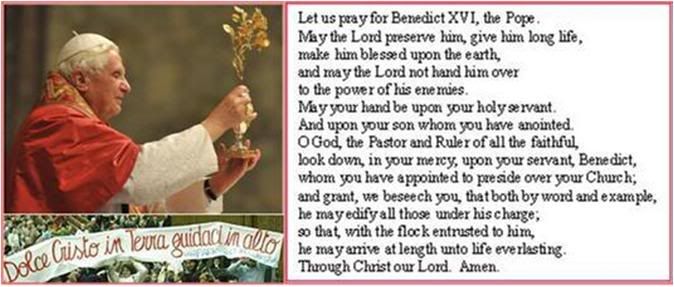
 Earlier 4/18/09 posts in the preceding page.
Earlier 4/18/09 posts in the preceding page.
 This is the post in the preceding page that cowgirl is commenting on.
This is the post in the preceding page that cowgirl is commenting on.
Those boys who spontaneously counter-demonstrated against leftists protesting the Pope's statements on condoms and AIDS in front of Paris's Notre Dame Catehdral last March 22 have gone on to formalize their movement TOUCHE PAS A MON PAPE! (Do not touch my Pope!)
And here's what they plan for tomorrow - a BENOITHON [pronounced Ben-wa-ton - with this translation of their online announcement]:
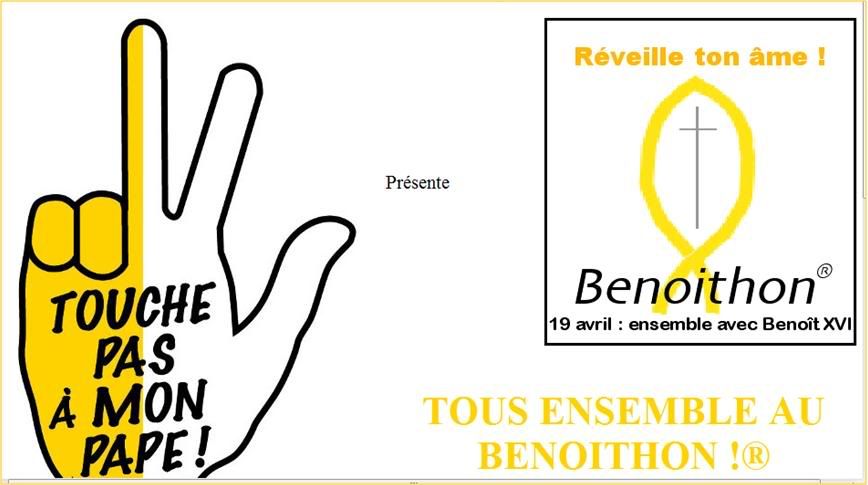
This Sunday, April 19, Feast of Divine Mercy, come celebrate with us the fourth anniversary of Benedict XVI's Pontificate and his 82nd birthday, by taking part in thE first BENOITHON®!:
fr-fr.facebook.com/event.php?eid=60904584751
Several Thanksgiving Masses will be offered throughout the day.
Starting at 19:30, come in numbers, with your families, in all calors, and bring cakes and drinks to celebrate around a 'Pot of Hope' in front of Notre Dame, in the joy of celebraitng, after John Paul II, a Pope as brilliant and as humble as Benedict XVI!
On this occasion, we will launch a collection drive for the first international NGO [UN-speak for non-governmental organization] that has been successfully fighting AIDS - the Catholic Church - through organizations like
dream.santegidio.org/x__homep.asp?Curlang=FR
The tagline on the BENOITHON logo says "Wake up your soul!" and "April 19: Together with Benedict XVI".
![[SM=g27811]](https://im0.freeforumzone.it/up/0/11/10151015.gif) Multiple Kudos to those kids!!!!
Multiple Kudos to those kids!!!!
[Modificato da TERESA BENEDETTA 18/04/2009 19:52] |
|
 18/04/2009 19:35 18/04/2009 19:35 |
|
| | | OFFLINE | | Post: 17.160 | Registrato il: 28/08/2005
| Utente Gold | |
|
 Five continents, one message:
Five continents, one message:
Four years of Benedict XVI
By Fr. Federico Lombardi
Weekly Editorial
Translated from
the Italian service of

Tomorrow, Benedict XVI completes four years of his Pontificate.
It was 18:43 on April 19, 2005, when the Cardinal Proto-Deacon, Jorge Medina Estevez of Colombia, announced the result of the Conclave that had just chosen the 265th Vicar of Christ.
Four years have passed - intense years, like last year and as the new year is shaping up to be. Let us listen to the weekly editorial of Fr. Federico Lombardi for the weekly information program Octavo Dies on CTV:
One year ago, Benedict XVI celebrated his birthday and the anniversary of his election while he was in the United States where he also addressed the peoples of the world at the United Nations.
He then travelled to other shores: In July, it was to Australia to meet with the representatives of the world's youth; in September, to France, where he visited Paris and Lourdes, major reference points for European culture and spirituality, respectively; and a few weeks ago, he was in Africa, to encourage hope among peoples who need to be rescued and to open the way to a new continental bishops' synod.
Four voyages, four continents. And in a few weeks, a fifth continent - Asia, for a pilgrimage of faith to the Holy Land, to speak of reconciliation in a land crucial for the dialog among the great religions of the world, and for world peace.
But we must not forget the great Synod on the Word of God [in October 2008], a true time of grace for the Church, along with the richness of a catechesis and a spiritual Magisterium that enriches and nourishes anyone who has the ears to listen.
To bring God to men and men to God - the God who manifested himself in the face of Christ - and to translate faith into dialog, the force of unity, and the witness of active charity.
This is the sense of Benedict XVI's Pontificate, as he reaffirmed himself with passionate force in his recent letter to the bishops of the world, in order that a brief period of tension within the Church and around it, may not let us lose sight of the center - the truly essential - and not to let us forget the vastness of the task and the historical, cultural and spiritual frontiers that we must work with.
So let us look ahead to a fifth year of the Pontificate which will open with a most demanding pilgrimage. Every person of good will and peace cannot but accompany the Pope to the Holy Land with the best of wishes and with the most profound human and spiritual solidarity.
Here's an unexpected piece from The Tablet, which for once, is a steraightforward news report, without th sniping and carping about the Pope that has been characteristic of the magazine's reporting about Benedict XVI.
Pope tells the world
to look to its ‘dark regions’
by Robert Mickens

18 April 2009
THE POPE ON Easter Sunday threw a spotlight on Africa and the Middle East as the parts of the globe in most urgent need of relief from suffering and conflict.
Speaking to more than 150,000 people who gathered in St Peter's Square for his Urbi et Orbi ("to the city and the world") blessing, the Pope said Christ was looking for men and women to help him affirm his victory over death by "using his own weapons ... of justice and truth, mercy, forgiveness and love".
In what is his most widely broadcast message of the Christian year, he called on Christians to engage in the "peaceful battle" against the forces of death that was "launched by Christ's Resurrection" and to help bring hope to the "dark regions of the world".
"If it is true that death no longer has power over man and over the world, there still remain very many, in fact too many, signs of its former dominion," the Pope said in Italian from the exterior central loggia of St Peter's Basilica.
He pointed to Africa's "unending conflicts", as well as the Israeli-Palestinian situation and a lack of peace and stability throughout the Middle East.
"Reconciliation - difficult, but indispensable - is a precondition for a future of overall security and peaceful coexistence," the Pope said. "At a time of world food shortage, of financial turmoil, of old and new forms of poverty, of disturbing climate change, of violence and deprivation which force many to leave their homelands in search of a less precarious form of existence, of the ever-present threat of terrorism, of growing fears over the future, it is urgent to rediscover grounds for hope."
Pope Benedict, who was 82 on 16 April, said the Resurrection was a "historical fact" and its proclamation lit up the "dark regions of the world" in which all people live.
"I am referring particularly to materialism and nihilism, to a vision of the world that is unable to move beyond what is scientifically verifiable and retreats cheerlessly into a sense of emptiness," he added. "If we take away Christ and his Resurrection ... every one of [man's] hopes remains an illusion."
The remarks came at noon, shortly after Pope Benedict had celebrated the second of two Easter Masses. The night before, he presided at the Easter Vigil, the most important celebration of the Church's year, in St Peter's Basilica.
"What great compassion [Jesus] must feel in our own time - on account of all the endless talk people hide behind, while in reality they are totally confused," the Pope said at the Vigil. The Church was "standing on history's waters of death and yet she has already risen" by holding Christ's hand.
Pope Benedict presided at four other Holy Week ceremonies, including a Chrism Mass at St Peter's and the Mass of the Lord's Supper at St John Lateran - both on Holy Thursday. He also led an afternoon liturgy at the Vatican commemorating the Lord's Passion and the popular torchlit Via Crucis later on Good Friday.
And with what excitement I read this item on RV's Italian service:
The Pope's Easter Message 'urbi et orbi'
now on YouTube with subtitles
in 27 languages
Translated from
the Italian service of

April 18, 2009
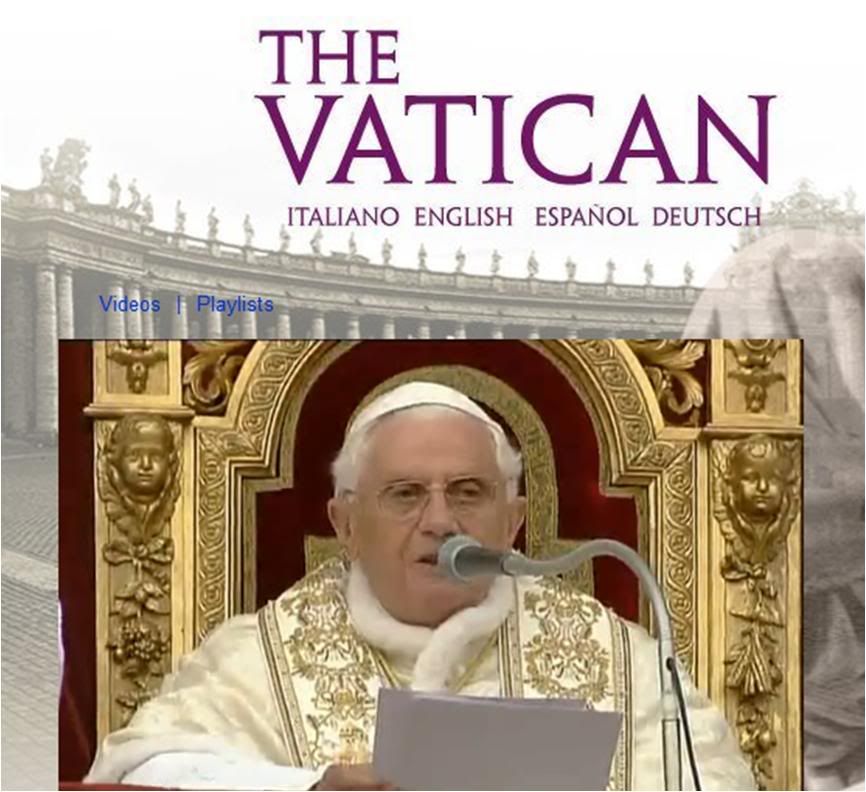
Benedict XVI's Easter Message 'urbi et orbi' is now on Vatican's YouTube channel. With a historical first, realized by Vatican Radio and the Centro Televisivo Vaticano (CTV):
The entire audio-video tape - 28 minutes long - is provided with subtitles available in 27 languages other than Italian.
This was in answer to requests to hear the Holy Father himself 'viva voce' [rather than the interpreter reading the translation of what he is saying] that has come from all sides these past weeks
The video includes the Pope's Easter greetings in 62 languages.
The available subtitles are in Arabic, Czech, German, English, Esperanto, Spanish, French, Hindi, Hungarian, Armenian, Italian, Japanese, Lithuanian, Latvian, Malayalam, Polish, Portuguese, Romanian, Russian, Slovenian, Albanian, Swedish, Vietnamese, Chinese, Slovak, Kiswahili, and Tamil.
This is the first time that any offering on YouTube has such a multilingual variety.
The subtitles can be activated by using the arrow at the lower right side of the videoscreen.
 I certainly wish everyone Good Luck - I tried it, and was ecstatic that I could read the subtitles so clearly and appropriately timed in Spanish, but then when I switched to English, I could not bring them up anymore, nor In Italian or German - even if I kept jiggling the 'Turn On-Turn Off Subtitles' button. Then I went back to the Spanish - and I couldn't get the subtitles back either.
I certainly wish everyone Good Luck - I tried it, and was ecstatic that I could read the subtitles so clearly and appropriately timed in Spanish, but then when I switched to English, I could not bring them up anymore, nor In Italian or German - even if I kept jiggling the 'Turn On-Turn Off Subtitles' button. Then I went back to the Spanish - and I couldn't get the subtitles back either.
Plus, there is no indication on the Home Page itself that subtitles are now available, and there are no instructions for how to use them. I wouldn't have known what to do had I not read the Vatican Radio item. Nor is there any indication how to bring on the languages other than the official languages of the site itself!
I hope all the fault is with me, that I am clueless, and that this is not yet another indication that the Vatican communications people - even with the best of intentions - somehow keep missing the bus!
Or maybe they haven't worked out all the glitches and hitches yet, so they have not announced the new subtitle service on the site itself.
And I was already looking forward to entire liturgies broadcast this way.... No more pesky unhelpful commentators who become an occasion for sin! Could it be, could it truly be possible?
Not even a commentator like Cardinal Foley who, to my horror and disbelief [and that of many others, from the reactions I've read on some blogs], said during the Easter Vigil Mass broadcast that the reason persons receiving Communion from the Holy Father are asked to kneel is "because the Holy Father is much shorter" than most people!
I think I understand now why in 20 years as president of the Pontifical Council for Social Communications, he really did nothing at all to improve the quality of Vatican broadcasts or communications in gemeral! But I am truly distressed that a cardinal should make such a blatant faux pas that was inappropriate, inmproper, and WRONG!!!!
No, wait! pERHAPS I'm being somewhat unfair to Cardinal Foley, considering worse things someone like Cardinal Schoenborn has done - after all, Foley's truly out-of-place and obviously wrong 'criticism' was trivial, compared to the criticism that supposed friend and 'protege' Schoenborn has made of the Pope!
[Modificato da TERESA BENEDETTA 24/04/2009 15:37] |
 19/04/2009 00:46 19/04/2009 00:46 |
|
| | | OFFLINE | | Post: 17.161 | Registrato il: 28/08/2005
| Utente Gold | |
|
 THE POPE MEETS THE FRANCISCAN FAMILY:
THE POPE MEETS THE FRANCISCAN FAMILY:
'Charism and Institution have always
been complementary in the Church'
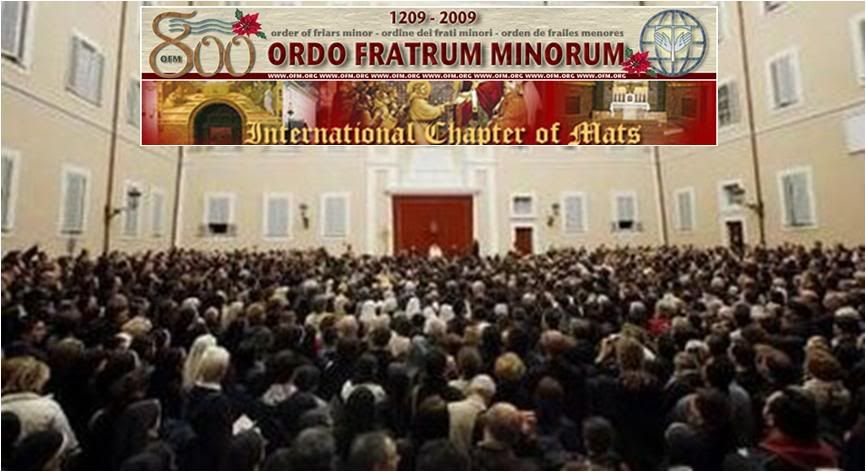
Pope Benedict XVI met Saturday at Castel Gandolfo with some 3000 memberes of the Franciscan family who held an 'International Chapter of Mats' earlier this week in Assisi to mark the 800th anniversary of when Pope Innocent II approved the first Rule drawn up by Francis of Assisi for his order of 'minor brothers'.
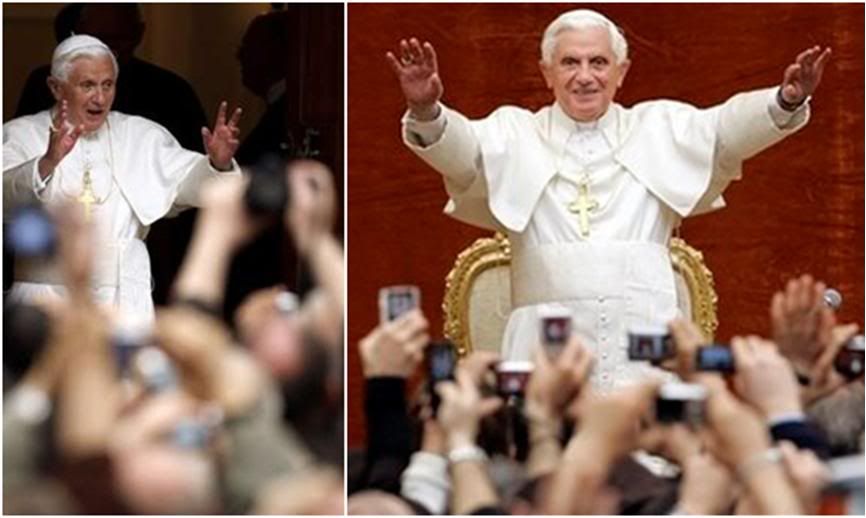
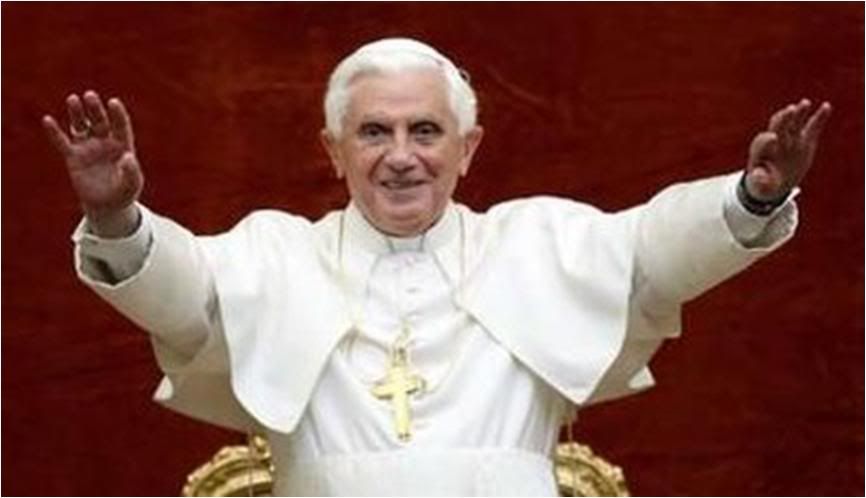
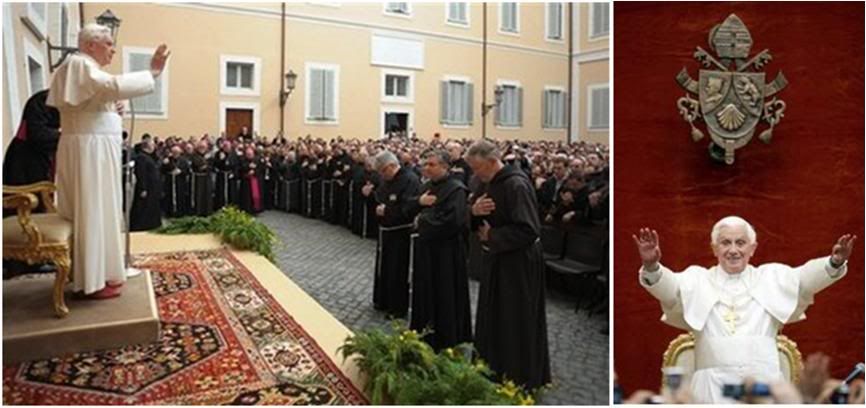
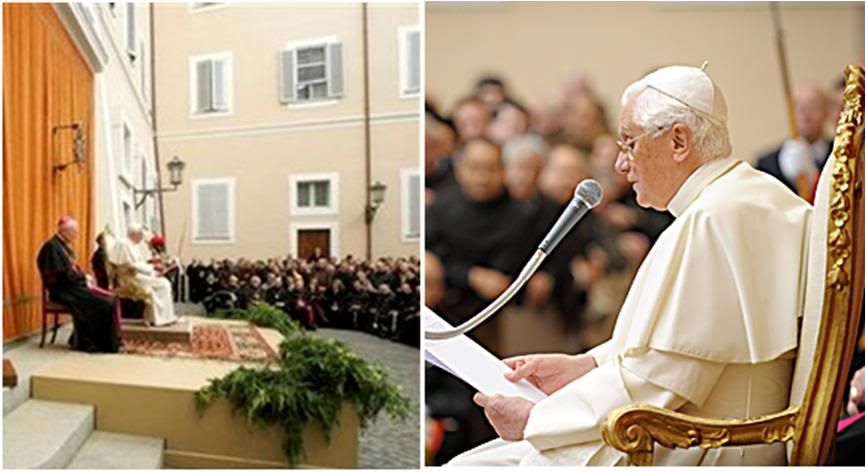
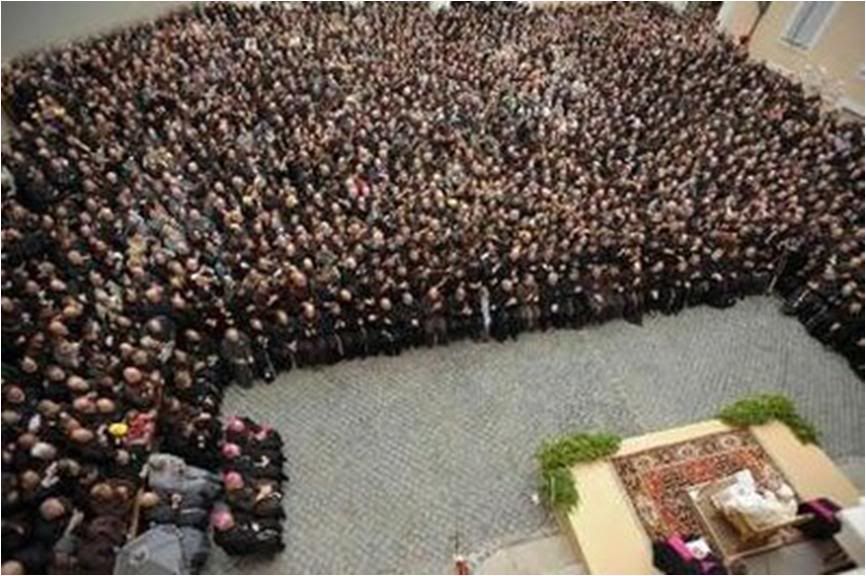 Here is a full translation of his address:
Here is a full translation of his address:
THE POPE'S ADDRESS
Dear brothers and sisters of the Franciscan family:
I welcome you all with great joy on this happy and historical occasion which has brought you all together: the eighth centenary of the approval by Pope Innocent III of the St. France's 'proto-Rule' for the order.
Eight hundred years have passed, and those first dozen priests have become a multitude disseminated in very part of the world and today worthily represented here by you.
In the past few days, you met in Assisi for what you wished to call a 'Chapter of the Mats' to recall your origins. And after this extraordinary experience, you have come here together to see 'il Signor Papa' as your seraphic founder used to say.
I greet you all with affection:
- the Minor Brothers of the three obediences, led by their respective Ministers-General, among whom I thank Fr. José Rodriguez Carballo for his kind words;
- the members of the Third Order, with their Minister-General;
- the Franciscan women religious and the members of secular Franciscan institutions;
and in particular, I greet the Bishop of Assisi, Mons. Domenico Sorrentino, who represents the Church of Assisi, land of Francis and Clare, and spiritually, of all Franciscans.
We know how important for Francis was his bond with the Bishop of Assisi in his time, Guido, who recognized his charism and sustained him. It was Guido who presented Francis to Cardinal Giovanni di San Paolo, who then introduced him to the Pope, a gesture which favored the approval of his Rule. Charism and Institution have always been complementary for the edification of the Church.
What can I tell you, dear friends? First of all, I wish to join you in giving thanks to God for the journey that he has allowed you to make, filling it with his benefits.
As pastor of the entire Church, I wish to thank him for the precious gift that you yourselves are for the entire Christian people.
That small stream that gushed forth at the foot of Mt. Subasio has brought forth a great river that has given a remarkable contribution to the universal diffusion of the Gospel.
Everything started with the conversion of Francis, who, following the example of Jesus, "emptied himself' (cfr Phil 2,7) and, wedding himself to Lady Poverty, became a witness and herald of our Father who is in heaven.
We can literally apply to the Poverello some expressions which the Apostle Paul used to refer to himself, and which I am happy to evoke in this Pauline Year:
"I have been crucified with Christ; yet I live, no longer I, but Christ lives in me; insofar as I now live in the flesh, I live by faith in the Son of God who has loved me and given himself up for me" (Gal 2,19-20).
Also: "From now on, let no one make troubles for me; for I bear the marks of Jesus on my body" (Gal 6,17).
Francis perfectly retraced these footsteps of Paul and can truly say with him: "To me, life is Christ" (Phil 1,21).
He experienced the power of divine grace and it was like having died and resurrected. All his previous riches, all his reasons for boasting and for certainty - everything became a 'loss' from the moment of his encounter with Jesus who had died and resurrected (cfr Phil 3,7-11).
Leaving everything becomes at that point almost necessary in order to express the over-abundance of the gift that is received. This is so great that it requires a total emptying, which still does not suffice: it also merits an entire life lived "according to the form of the Holy Gospel" (2 Test., 14: Fonti Francescane, 116).
And here we come to the point which is surely at the center of our meeting today. I would summarize it this way: the Gospel as a rule of life.
"The Rule and life of the minor friars is this, namely, to observe the holy Gospel of our Lord Jesus Christ", Francis wrote at the start of the approved Rule (Rb I, 1: FF, 75).
He understood himself completely in the light of the Gospel. And this is his fascination. This is his perennial relevance.
Tommaso da Celano said that the Poverello "always carried Jesus in his heart - Jesus on his lips, Jesus in his ears, Jesus in his eyes, Jesus in his hands, Jesus in all his other members. Indeed, travelling so often and meditating or singing of Jesus, he would forget that he was on a trip and would stop and invite all creatures to join in praising Jesus" (1 Cel., II, 9, 115: FF, 115).
Thus the Poverello became a living Gospel, able to attract to Christ men and women in every age, especially young people who prefer radicalness to half measures.
The Bishop of Assisi, Guido, and Pope Innocent III recognized evangelical authenticity in the proposal of Francis and his companions, and knew how to encourage them in their commitment, having in mind the good of the Church.
A reflection comes forth spontaneously: Francis could have chosen not to go to the Pope. Many religious groups and movements were being formed at that time, and some of them set themselves up as institutions against the Church, or at least, they did not seek her approval.
Certainly, a polemical attitude towards the Church hierarchy would have gained Francis not a few more followers. Instead, his first thought was to place himself and his companions in the hands of the Bishop of Rome, the Successor of Peter. This fact reveals his authentic ecclesial spirit.
From the start, he thought of the small "we' that he had started with his first brothers as within the great "we" of the one and universal Church. The Pope recognized and appreciated this.
But even the Pope, for his part, could have not approved Francis's plan of life. We can well imagine that among the collaborators of Innocent III, someone might have advised him that way, perhaps fearful that that small band of brothers would be like other heretical mendicant groups of that time.
Instead, the Roman Pontiff, well informed by the Bishop of Assisi and by Cardinal Di San Paolo, discerned an initiative of the Holy Spirit and welcomed, blessed and encouraged the nascent community of 'minor friars'.
Dear brothers and sisters, eight centuries have passed, and today, you have wished to renew the gesture of your founder. You are all children and heirs of those beginnings - from the 'good seed' that Francis was, conformed in his turn to the 'grain of wheat' that our Lord Jesus is, who died and rose again to bear much fruit (cf Jn 12,24).
The saints re-propose the fecundity of Christ. Like Francis and Clare of Assisi, you too committed yourselves to following this same logic: to lose your own life for Jesus and the Gospel, thus saving that life and making it fertile with abundant fruits.
As you praise and thank the Lord, who has called you to be part of such a great and beautiful 'family', remain attentive to what the Spirit tells it today, in each of its components, in order to continue announcing the Kingdom of God with passion, in the footsteps of your seraphic father.
May every brother and sister always guard within a contemplative spirit that is simple and happy: Always take off from Christ, as Francis took off from the look of the Crucified Lord in San Damiano and from his encounter with the leper, in order to see the face of Christ in our brothers who suffer and to bring his peace to everyone.
Be witnesses to the 'beauty' of God, which Francis sang as he contemplated the wonders of Creation, and which made him exclaim to the Most High, "You are beauty!" (Praises of the Highest God, 4.6: FF, 261).
Dearest ones, the last word that I wish to leave with you is the same one that the risen Christ left to his disciples: "Go forth!" (cfr Mt 28,19). Go and continue to 'repair the house' of the Lord Jesus Christ - his Church.
In the past several days, the earthquake that struck the Abruzzo region has seriously damaged many churches, and you from Assisi know very well what this means. But there is a 'ruin;' that is even more serious: that of persons and communities.
Like Francis, always start with yourselves. It is us, first of all - we are the house that God wants to restore. If you are always able to renew yourself in the spirit of the Gospel, you will continue to help the Pastors of the Church to always make her face as the Spouse of Christ ever more beautiful. This is what the Pope, today as it was at the beginning, expects of you.
Thank you for coming here. Now, go and bring to everyone the peace and the love of Christ the Savior. May the Immaculate Mary, "Virgin made Church' (cfr Greetings to the Blessed Virgin Mary, 1: FF, 259), always accompany you.
And may you be sustained also by the Apostolic Blessing, which I impart from the heart to all of you who are present here and to the entire Franciscan family.
In English, he said:
I am pleased to welcome in a special way the Minister Generals gathered with the priests, Sisters and Brothers of the world-wide Franciscan community present at this audience.
As you mark the 800th anniversary of the approval of the Rule of Saint Francis, I pray that through the intercession of the Poverello, Franciscans everywhere will continue to offer themselves completely at the service of others, especially the poor.
May the Lord bless you in your Apostolates and shower your communities with abundant vocations.
In Spanish, he said:
I affectionately greet the dear brothers and sisters in the Franciscan family who come from the Spanish-speaking nations.
On this significant commemoration, I encourage you to be increasingly enamored of Christ so that, following the example of Francis of Assisi, you may conform your lives to the Gospel of the Lord and give the world your generous testimony of charity, poverty and humility.
May God bless you!
In Polish, he said:
I address a heartfelt greeting to the Polish Franciscan family, and with it, I embrace fathers and brothers, Franciscan sisters and Clarissan nuns, and the other congregations founded on the spirituality of St. Francis, including the men and women of the tertiary orders.
On the 800th anniversary of the approval of the 'Proto-Rule', I thank God with you for every good that the order has brought to the life and development of the Church.
I thank you particularly for your missionary commitment in the different continents. Following the example of your founder, be persevering in the love of Christ and bring the joy of the Gospel to all men.
May the blessing of God sustain you.

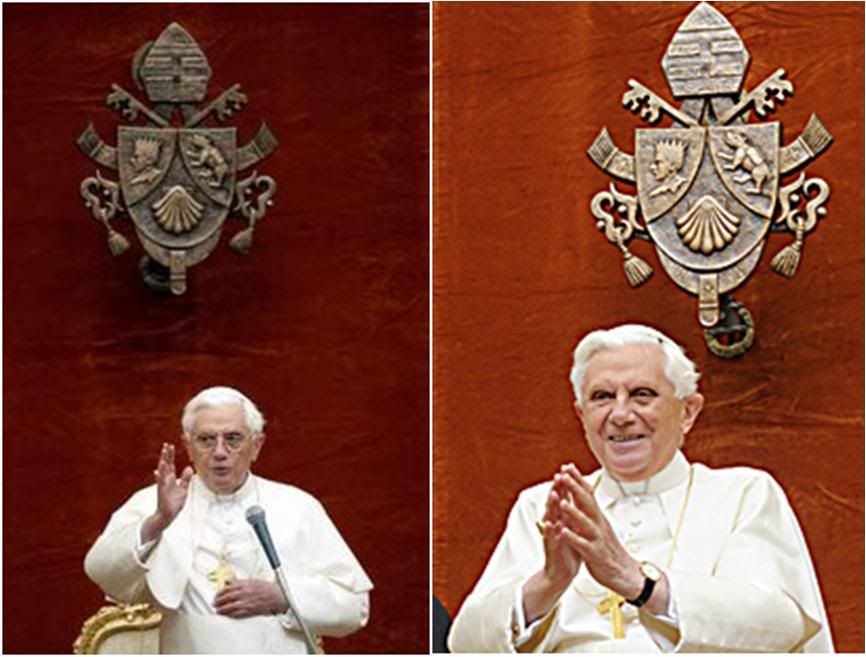
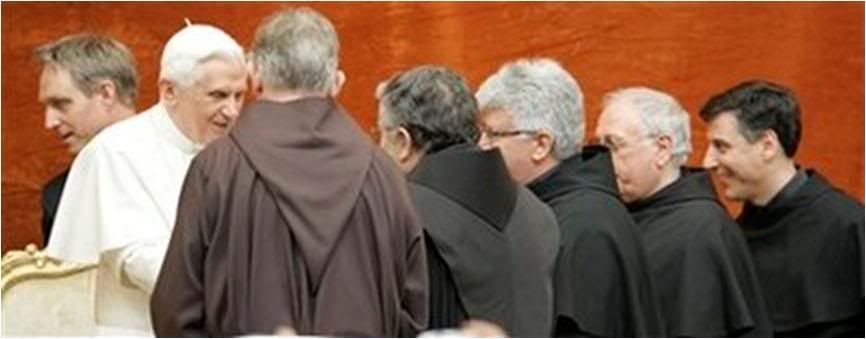
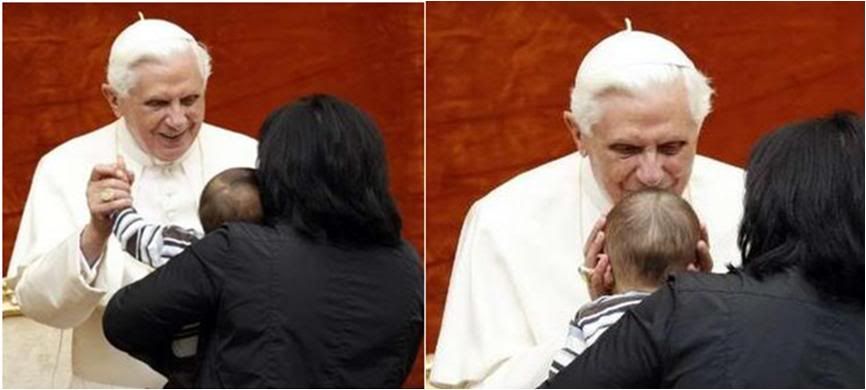
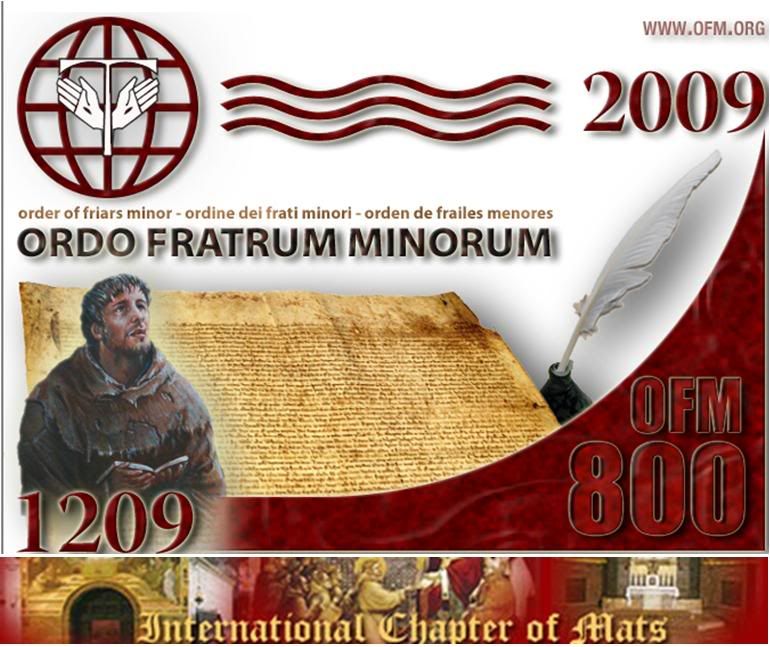
[Modificato da TERESA BENEDETTA 19/04/2009 00:53] |
 19/04/2009 02:14 19/04/2009 02:14 |
|
| | | OFFLINE | | Post: 17.162 | Registrato il: 28/08/2005
| Utente Gold | |
|

 I replaced the original title given by the magazine to this article because I find it in bad taste.
Benedict at 82:
I replaced the original title given by the magazine to this article because I find it in bad taste.
Benedict at 82:
Four years as Pope
and counting...

April 17, 2009
Pope Benedict XVI turned 82 on Thursday, and on Sunday he’ll mark the fourth anniversary of his election to the papacy -- in American argot, what we might call the end of his first term.
Media outlets have prepared analyses to mark the occasion, most of which collect predictable commentary from the usual suspects (my own sound-bites very much included.)
Here’s one striking wrinkle, however, by way of a “dog that didn’t bark” dynamic: Despite the fact that Benedict XVI is now 82 years old, there’s been virtually no drumbeat this week about papal succession.
By the time John Paul II turned 82 in May 2002, speculation about what might come next was very much in the air, fueled by the Pope’s visible decline.
The absence of talk about the papal horserace is probably the best measure of Benedict’s essentially robust health. The buzz in Rome is that we could be looking at another Leo XIII, who died in 1903 at the age of 93.
Of course, God alone knows what the future holds, but for now it’s full steam ahead. In fact, Benedict XVI is approaching what is likely to be not only a defining moment of his pontificate, but also one of the most important news stories of 2009, and not just on the religion beat: his May 8-15 trip to Jordan, Israel, and the Palestinian Territories.
In the run-up, comparisons inevitably will be drawn with John Paul II’s dramatic March 2000 voyage to the Holy Land, when the Polish Pope, who grew up in the shadow of Auschwitz, stood at the Western Wall in Jerusalem and left behind a handwritten note apologizing for Christian anti-Semitism.
Benedict XVI’s visit may or may not feature a similar iconic image, but at the level of substance, there’s arguably even more at stake this time around. (This despite the fact that organizers have taken great pains to emphasize the trip is not “political,” and to frame it primarily as a spiritual pilgrimage for an 82-year-old Pontiff who will probably never have another chance to visit the land of the Bible.) [Even if it were, it is morbidly inappropriate, to say the least, to verbalize it this way! This is the line that was the original title for the column.]
The following are five storylines destined to run through the trip, illustrating why it’s worth getting a head start on pondering its prospects.
Catholic/Jewish relations
Ties between Catholicism and Judaism were badly frayed by the recent fiasco involving the lifting of the excommunications of four traditionalist Catholic bishops, including one who is a Holocaust-denier.
The Vatican has repeatedly insisted that the gesture did not signal a rollback in relations, but many Jews still have their doubts – especially because it came hard on the heels of a similar eruption in 2007, when Benedict XVI authorized wider celebration of the old Latin liturgy that includes a controversial Good Friday prayer for the conversion of Jews.
(The latest irritant on that front came just last week. The German chapter of the traditionalist Society of St. Pius X, to which the four reinstated bishops belong, insisted upon praying the classic version of the Good Friday prayer, which refers to the “blindness” of the Jews, and not the version issued by Benedict XVI in February 2008 that removed much of the contested language.)
Also lurking in the background are on-going disputes over the memory of Pius XII, the wartime Pope sometimes accused of “silence” during the Holocaust, as well as over the tax and juridical status of church properties in Israel.
The Vatican formally recognized Israel in 1993, with assurances that side agreements on these matters would follow. More than fifteen years later, the two sides have yet to nail down a deal.
More broadly, Catholic/Jewish relations today stand at a crossroads. The pioneers of dialogue on the Catholic side, many of whom felt a personal commitment to improving ties with Judaism because of their memories of the Holocaust, are passing from the scene.
Leadership in Catholicism is increasingly coming from Africa, Latin America and Asia, where Judaism is not generally a significant demographic presence.
Moreover, Catholics in the global south often don’t have the same sense of historical responsibility for the Holocaust as Europeans, which they tend to see in terms of Western, rather than Christian, guilt.
While these leaders recognize the Biblical roots of the Christian/Jewish relationship, they often don’t feel the same biographical commitment to it, nor do they have the same experience of regular interaction and personal friendships with Jews.
As a result, there’s a risk of drift in Catholic/Jewish dialogue, especially as other relationships – Islam above all – come to loom larger in the Catholic mind. Benedict XVI thus faces the challenge of laying an enduring foundation for the relationship, and of persuading Jews around the world that the Catholic church is serious about it.
At this level, probably the most-watched moment of the trip will come on May 11, when Benedict XVI visits the renowned Holocaust memorial at Yad Vashem in Jerusalem. In what many will see as a reminder of the tensions that plague the relationship, the pope will not enter the museum at Yad Vashem, which contains a placard critical of Pius XII to which the Vatican has long objected.
Catholic/Muslim relations
When Benedict XVI lands in Jordan on May 8, it will be his first visit to an Arab nation and his first to a predominantly Muslim country since Turkey in late November/early December 2006.
As it turned out, the Turkey trip became a kiss-and-make-up exercise in the wake of the Pope’s famous September 2006 speech in Regensburg, Germany, which inflamed sentiment across the Muslim world because of its incendiary citation of a 14th century Byzantine emperor with some nasty things to say about Muhammad, the founder of Islam.
The iconic image from Turkey was Benedict XVI standing inside the Blue Mosque, shoulder-to-shoulder with the Grand Mufti of Istanbul, for a moment of silent prayer in the direction of Mecca.
Because the Turkey trip was hijacked by damage control, Jordan offers Benedict his first real opportunity to lay out his vision of Catholic/Muslim relations while on Islamic turf. [How could it have been 'hijacked by damage control' when it turned out to be such a great triumph even with the Turkish media????]
That vision goes under the heading of “inter-cultural dialogue,” and it boils down to this: Benedict XVI believes the real clash of civilizations in the world today runs not between Islam and the West, but between belief and unbelief. In that struggle, he believes Christians and Muslims should be natural allies.
As a result, he has deemphasized the fine points of theological exchange – how Christians and Muslims each understand atonement, for example, or scripture.
Instead, his priority is a grand partnership with Muslims in defense of a robust role for religion in public affairs, as well as shared values such as the family and the sanctity of life. (Among other things, that means joint efforts against abortion and gay marriage.)
The price of admission to that partnership, Benedict believes, is for Islam to denounce violence and to accept the legitimacy of religious freedom.
In that sense, he sees himself as a friend of Islam, promoting reform from within a shared space of religious and moral commitment. To date, however, he has not found an argot for making that pitch successfully to the Muslim “street.”
The Jordan leg of the trip may well be the Pope’s best opportunity to get it right, especially because Jordanian Muslims have tried hard to meet the Pope halfway, seeing themselves as natural leaders of Islam’s moderate majority.
In the wake of the Regensburg contretemps, it was Jordan’s Royal Aal al-Bayt Institute for Islamic Thought that took the lead in organizing Islamic scholars to respond and to foster new Muslim/Catholic dialogue. If Benedict can’t connect here, it’s an open question what chance he stands anywhere else.
[Now why would Allen even raise the question of whether the Pope 'can connect here'? King Abdullah of Jordan was one of the first Muslim leaders ever to visit him as Pope, followed by a separate visit the next year by his Queen.
His cousin Prince Talal is the primary mover behind A COMMON WORD and the Royal Institute of Islamic Thought. Both are young men below 50 who were highly educated in England and the United States. Benedict is probably as conversant about Islam on a farily sophisticated level than more than the rest of the Church hierarchy. He'd have to be extremely insensitive - or the Jordanian royals extremely unfriendly, which they are not - for them not to connect.]
Certainly the Pope’s schedule reflects a desire to reach out. On May 9, he’ll meet with a delegation of Muslim leaders at the Al-Hussein bin-Talal Mosque, the largest mosque in Jordan.
On May 11 he addresses an inter-religious assembly in Jerusalem that will include Muslims, and the next day he will become the first Pope ever to visit the Dome of the Rock, the oldest extant Islamic building in the world, believed by Muslims to mark the spot from which Muhammad ascended to Heaven alongside the angel Gabriel.
Indeed, the very fact that Benedict XVI has elected to spend three full days in Jordan before moving on to Israel has been presented as a sign of his interest in deepening ties with Muslims, and with the Arab world. In 2000, John Paul II devoted only 24 hours of his seven-day itinerary to Jordan.
Exodus of Christians from the Holy Land
Though Europe may be the cradle of Christendom, the Holy Land is where it all began. At a psychological and spiritual level, it’s impossible to overstate the significance of holy places such as Jerusalem, Bethlehem and Nazareth for the Christian imagination.
Moreover, the presence of Christian communities in those locations creates a natural bridge among the three great monotheistic religions. Especially for Christian/Muslim relations, having a group of Christians who speak Arabic and who know the situation on the ground is invaluable.
Those realities make the present “exodus” of Christians out of the Holy Land a source of deep angst for the Pope and other Christian leaders.
The numbers are stark: In 1948, at the time of the partition, Christians amounted to 15-20 percent of the population in what was to become Israel and the Palestinian Territories.
Today, the Christians are estimated at less than 2 percent. There are more Palestinian Christians living in émigré communities in Europe, Canada, the United States and Australia than in Palestine itself.
Like everything else in the Middle East, who’s responsible for this exodus is a matter of debate. Palestinians tend to blame the Israeli occupation, while Israelis and American conservatives often fault a rising tide of Islamic fundamentalism.
Others say the plain fact is that given the political and economic paralysis of the region, anybody who has a chance is likely to at least consider fleeing, and Palestinian Christians often have access to overseas networks of support that make it easier to relocate.
Whatever the case, a growing number of analysts warn ominously that Christianity faces the prospect of “extinction” in the land of its birth.
It’s not clear how much Benedict XVI, or any Christian leader, can do to arrest this trend. Local Jews and Muslims both have clear demographic strategies for bolstering their presence: Israel encourages aliyah, meaning Jewish immigration to the country, while Yasser Arafat once famously said that his most potent weapon is “the womb of the Arab woman.”
There’s no similar push for Christians to beef up their numbers, suggesting that at least in the short run, the decline may be irreversible.
What Benedict XVI may be able to accomplish, however, is to galvanize Christians around the world to support the struggling Christian communities of the Holy Land financially, politically, and spiritually. Concretely, he could encourage pilgrimage to the Holy Land as an act of Christian solidarity.
Benedict’s stop in Jordan should also afford him the opportunity to address another group of embattled Christians, from another Middle Eastern hot spot: Iraqi Christians, tens of thousands of whom have taken refuge in the country.
(Some estimates put the number of Iraqi refugees currently in Jordan as high as one million, representing 18 percent of the overall population. Christians are over-represented among the refugees, which ironically makes Jordan the one country in the Arab world where the Christian share of the population has actually gone up.)
A logical moment for the Pope to meet Iraqis, and to address Iraq’s future, may come on May 10, when he’s scheduled to bless the first stone of a new Catholic church at Bethany beyond the Jordan (known in Arabic as Wadi al Kharran), which Christian tradition regards as the site where Jesus was baptized by John.
The Wadi al Kharran stop will also be significant for a different reason: officials in Jordan want it to become a new “capital” of Christian-Muslim dialogue. [Prince Talal, who sponsored the building of the new church in Bethany, will also be the Pope's guide on this important stop.]
The Vatican and the Israeli/Palestinian Conflict
Catholicism is unique among world religions in that it has its own diplomatic corps, and aspires to act as a voice of conscience in global affairs.
Beyond that humanitarian logic for engaging in the peace process, the Vatican also feels a direct stake in the outcome, seeing it as key to preserving what’s left of the Christian presence in the Holy Land.
Benedict will have a chance to see the human face of the conflict up close, visiting a Caritas-operated hospital for infants on May 13, as well as the fifty-year-old Aida Camp, with a population of more than 3,000 long-term refugees.
On that level, perhaps the key difference between the visits of John Paul II and Benedict XVI is that back in the spring of 2000, the prospects for peace seemed far brighter.
When John Paul touched down in March, preparations were already underway for the Camp David Summit in July, when Arafat and then-Israeli Prime Minister Ehud Barack walked up to the brink of a deal.
Benedict, meanwhile, arrives on the other side of Israel’s conflict with Hamas in Gaza, as well as the election of a new government in Israel whose foreign minister has cast doubt on the very idea of a two-state solution.
Further complicating Benedict’s peace-making effort is the Vatican’s reputation among many Israelis as less than a fair broker. Officially, the Holy See is even-handed: it supports the right of both Israelis and Palestinians to sovereignty and security, and calls for an “internationally guaranteed special status” for the holy places that does not prejudice the question of whether Jerusalem should be the capital of Israel, a Palestinian state, or both.
In reality, however, the Vatican has long been sort of a mirror image of American Evangelicals: A Christian force in the West that, for reasons both theological and political, takes a keen interest in the Middle East, only in this case tending to favor the Palestinians rather than the Israelis.
(One small but telling symbol of where the Vatican’s heart lies is that an ivory set of the Stations of the Cross, which currently adorn the chapel of the Synod Hall, were a gift to John Paul II from Arafat.)
[What then? Benedict should replace the Stations - placed there by his predecessor - just to show the Vatican does not take sides? Sometimes, fairly trivial things are analyzed needlessly and over-read!]
This pro-Palestinian tilt is informed by a variety of factors, but probably none so decisive as the simple fact that the Christians on the ground, from whom the Vatican often takes its cues, are mostly Palestinians. If Christianity is to have a future in the Holy Land, its center of gravity will inevitably be in a Palestinian state.
{I have to check it out, but I saw a recent article which states a surprising number of Israeli Christians, much larger than the estimate of Palestinian Christians!]
Perceptions of pro-Palestinian bias have long been a sore point in Vatican/Israeli relations, most recently when a senior Vatican official compared the Israeli presence in the Gaza Strip to a “giant concentration camp.”
That was hardly unprecedented: In the spring of 2002, Israel repeatedly protested L’Osservatore Romano’s insistence on referring to a standoff at the Basilica of the Nativity in Bethlehem as an Israeli “siege,” even though it began when Palestinian gunmen stormed the church.
[I am starting to be quite skeptical of the OR's objectivity, even under Vian - it becomes more questionable the closer one follows what they report day to day and how they report it. They do what the Western MSM do - more often than not, their writers insert their personal biases into their news reports on secular events and in their headlines. It is a disservice to the Pope because it gives the impression that he sanctions such biases!]
In July 2005, when Israel complained that Benedict XVI had not included an Israeli town on a list of places hit by recent terror attacks, a Vatican spokesperson testily replied that the Pope was reluctant to denounce such attacks for fear of legitimizing disproportionate military responses from Israel that violate international law.
Just in the last few days, Israelis objected that the Vatican has chosen to participate in the U.N.’s “World Conference Against Racism” in Geneva April 20-24, rather than joining the United States, Canada, Italy, and other nations in distancing themselves from the event (also known as the “Durban Review Conference”) on the grounds that it equates Zionism with racism, and singles out Israel for blame.
If the Catholic Church wishes to serve as a catalyst for peace, its leadership obviously must convince both Israelis and Palestinians of their impartiality. Benedict thus has to walk a tightrope:
Reassuring Israelis that he’s sympathetic to them, despite the history sketched above, while not creating alarm among Palestinians that the Vatican is abandoning their cause.
The Vatican, American Catholics, and Obama
This week’s big Vatican story was its denial of reports circulated in the Italian and American press that several Obama nominees as ambassador to the Holy See have been rejected, including Caroline Kennedy, on the basis of their pro-choice politics.
One senior Vatican diplomat testily told me on Monday that these reports are “all lies,” fueled by a penchant among some Italian journalists for penning romanzi, meaning novels, rather than facts.
This attempt to downplay conflict with the White House is symptomatic of a clear difference in tone between the Vatican and conservative Catholic circles in the States vis-à-vis Obama.
While the Vatican yields pride of place to no one in its pro-life commitment, it also has other interests where it senses the potential for a meeting of minds with the new American administration, including poverty relief, multilateralism in foreign policy, arms control and conflict resolution.
In particular, the Vatican likes what it’s heard so far from the Obama team on the Israeli/Palestinian problem. Another senior Vatican diplomat told me this week that the Holy See has been “encouraged” by Obama’s reiteration of support for a two-state solution, and by his desire to reach out to Iran.
(Given that Iran is a major backer of Hamas, the Vatican, like many international observers, believes the Iranians must be part of a resolution.)
Benedict’s trip to the Holy Land thus represents the first opportunity to “road test” the prospects for collaboration between the United States and the Vatican with regard to a critical shared objective – peace in the Middle East.
That’s an especially live prospect given the likelihood that Benedict and Obama will meet in person shortly afterwards, on the occasion of the G-8 summit in Italy in July.
This storyline may be particularly beguiling in view of a notable coincidence: Benedict’s trip to the Holy Land wraps up on May 15, just two days before Obama’s much-ballyhooed May 17 commencement address at the University of Notre Dame.
 Jordanian and Israeli websites
Jordanian and Israeli websites
on the Pope's visit now open
As previously announced, the national tourism offices of both Jordan and Israel have each opened a website for teh papal visit. So far, both have background ionformation - much more on the Jordanian site (including a lookback at John paul II's visit in 2000), which is also better-designed.
www.visitjordan.com/pope/
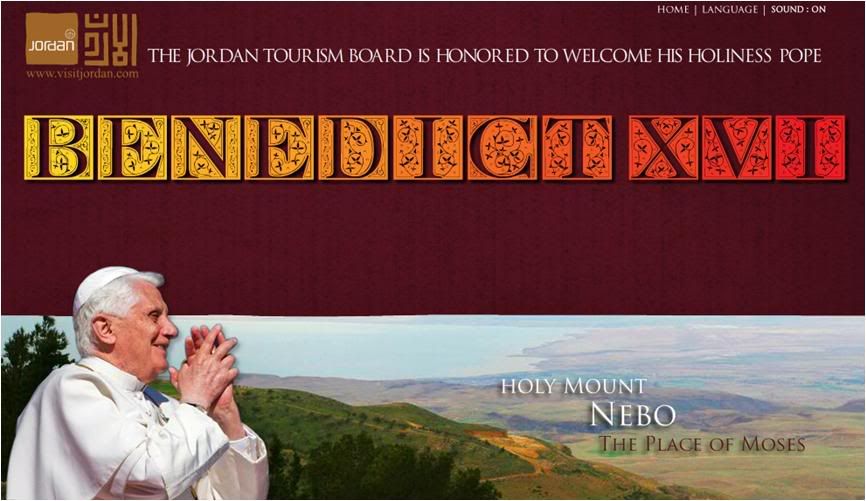 www.holyland-pilgrimage.org/
www.holyland-pilgrimage.org/
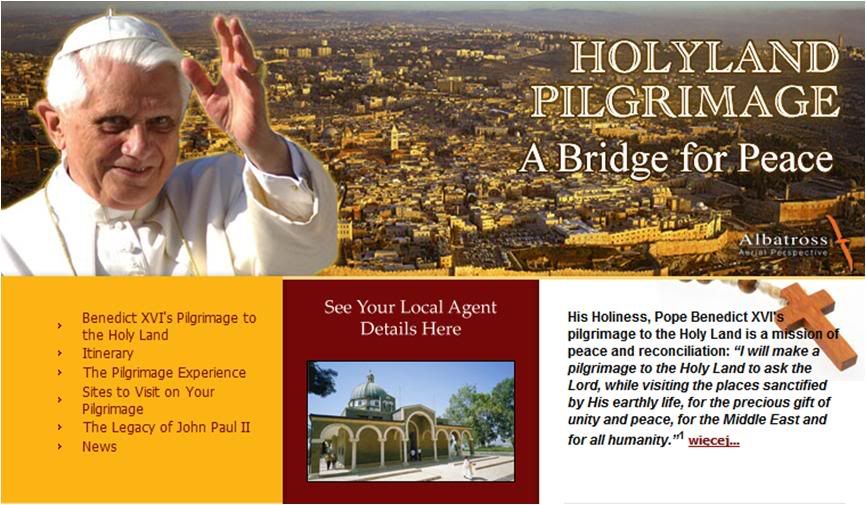
Meanwhile, the Israeli post office has issued its commemorative stamps for the visit.
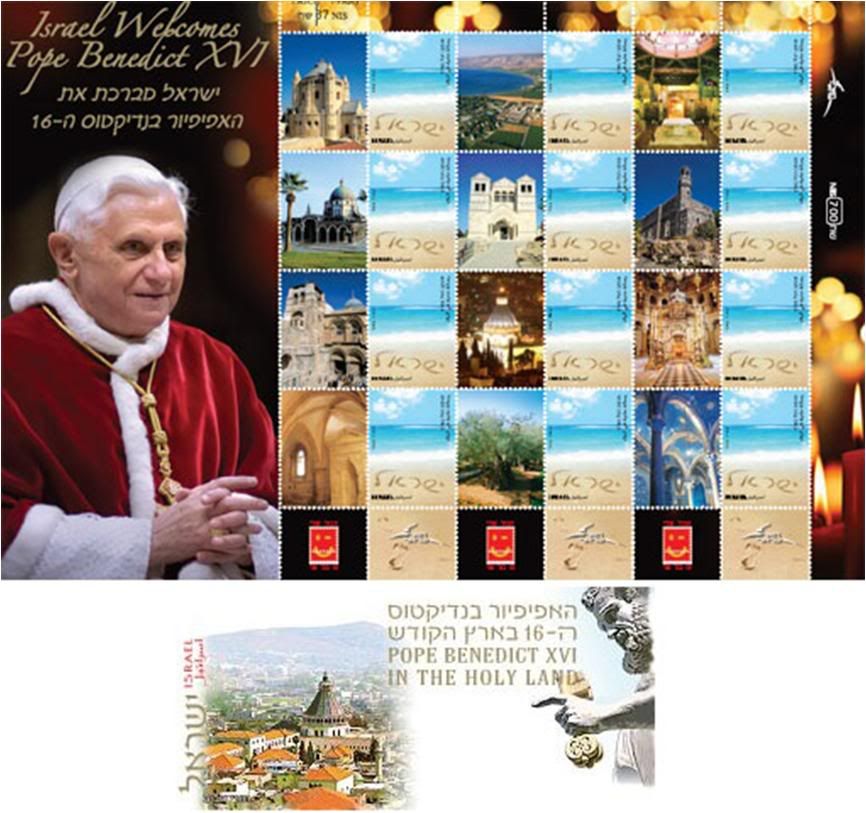
[Modificato da TERESA BENEDETTA 19/04/2009 11:28] |
 19/04/2009 04:27 19/04/2009 04:27 |
|
| | | OFFLINE | | Post: 17.163 | Registrato il: 28/08/2005
| Utente Gold | |
|
 The Pope
The Pope
and the mystery of the moon
Editorial
by Giovanni Maria Vian
Translsted from
the 4/19/09 issue of

The fifth year begins in the Pontificate of Benedict XVXI, who was elected with a rapidty almost unprecedented by the largest Conclave ever assembled.
And yet, the new Pope did not celebrate his election in trumphant tones, and in the homily at his inaugural Mass as Bishop of Rome, he said something surprsing: "Pray for me that I may not flee in fear before the wolves".
A powerful image, whose significance was never better understood than in these last trying months.
A connoisseurr of tradition, the Pontiff knows that the affairs of the Church in the world are like the alternating phases of the moon, which periodically grows and diminishes, and whose splendor comes from the light of the sun, namely, from Christ.
Thus, the mystery of the moon described by the early Christian authors
is that of the Church, often persecuted, just as often obscured by the filth resulting from the sins of its children - as Joseph Ratzinger denounced a few weeks before his election - but she always comes back and grows again, illuminated by its Lord.
To carry and to show the light of Christ in the world's obscurity - as the Bishop of Rome once more did in the initial darkness of the Easter vigil, a gesture repeated in every corner of the earth - is the essential mission of the Pope.
He is conscious that in many countries, even those with a long Christian tradition, this light risks being extinguished. as he wrote in his last letter to all the bishops - reaffirming, in tones of sorrowful amazement at the distortion of facts, the unrecognized priorities of his Pontificate.
Above all, his testimony is that God is not far from every human being and that he is truly, as the Oriental liturgies repeat incessantly, a friend to men.
That is why Benedict XVI asks that the transcendent not be excluded from the horizon of history. That is why he asks with the same trust as his predecessors that man not close himself off, at the very least, to the reasonable possibility of God.
And not just any god, or worse, an idol - in a materialistic society where idolatry is similar to that in antiquity - but the God who revealed himself to Moses, the Word that became flesh in Jesus.
To speak of God, Benedict XVI celebrates him in the liturgy, and explains, as few bishops of Rome have been able to, concerned about the peace in the Church that he wishes to re-establish, as he did - with an offer of mercy and reconciliation that is in perfect continuity with Vatican II - with regard to the Lefebvrian bishops.
For this, the Pope wishes to advance along the ecumenical journey, for this he has confirmed the desire for friendship and a common religious search with the Jewish people. For this he is accelerating the encounter with the other great religions, with particular attention to cultural roots - so that this encounter may bear real fruits on concrete issues, like respect for religious freedom and thw dignity of the human being, as that which is taking place with the Muslims.
And so it is particularly striking that this limpid process should be ignored, and that Benedict XVI and Catholics continue to be portrayed, especially in some European countries, in negative and hostile terms. Which is what happened in the near blackout on the trip to Africa and with the media silence about the Pope's Easter homilies.
But the Pope does not fear the wolves. And he is not alone because he is sustained by the prayers of the Church. Which, like the moon, always draws its light from the Sun.
 Vian makes some good points, but somehow, I expected a more solidly constructed, well thought out,
Vian makes some good points, but somehow, I expected a more solidly constructed, well thought out,
though not brilliant, editorial for the occasion.
[Modificato da TERESA BENEDETTA 24/04/2009 15:31] |
 19/04/2009 13:07 19/04/2009 13:07 |
|
| | | OFFLINE | | Post: 17.165 | Registrato il: 28/08/2005
| Utente Gold | |
|

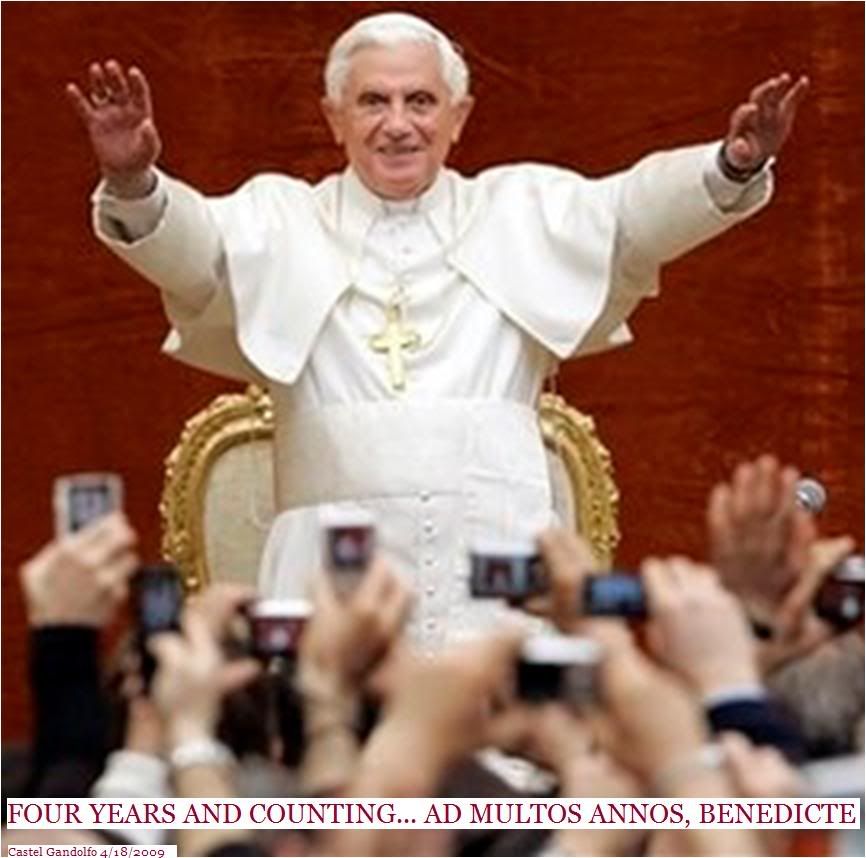
ONCE AGAIN -AND WE CAN NEVER TIRE, YOUR HOLINESS-
ALL OUR LOVE AND PRAYERS
ON THIS THIRD GREAT EVENT
OF YOUR PERSONAL PASCHAL TRIDUUM
(EASTER, BIRTHDAY AND ANNIVERSARY).
WE THANK GOD FOR GIVING YOU TO US AND
WE THANK YOU FOR ALL YOU ARE AND ALL YOU DO.


April 19
Divine Mercy Sunday
Blessed Luchesio and Buonadonna (Italy, +1260)
Firrt Franciscan Tertiaries
OR today.
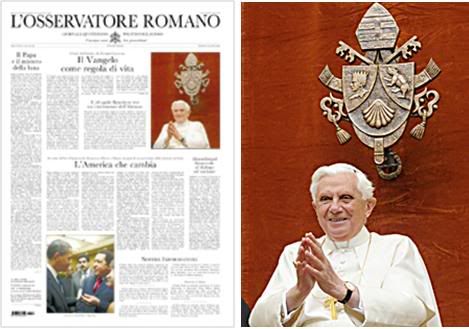
The Pope's reminder to the Franciscan Family:
'The Gospel as the rule of life'
Other Page 1 stories: Adn editorial on the Pope and his mission (translated in
the preceding post); an announcement about the Pope's April 28 visit to
the earthquake victims in the Abruzzo; a story on the summit of the Amereicas
in Port of Spain, Trinidad; and Ahmadinejad's talk about dialog on nuclear
weapons even as Iran pursues its nuclear-bomb development program.
THE POPE'S DAY
Regina Caeli at Castel Gandolfo


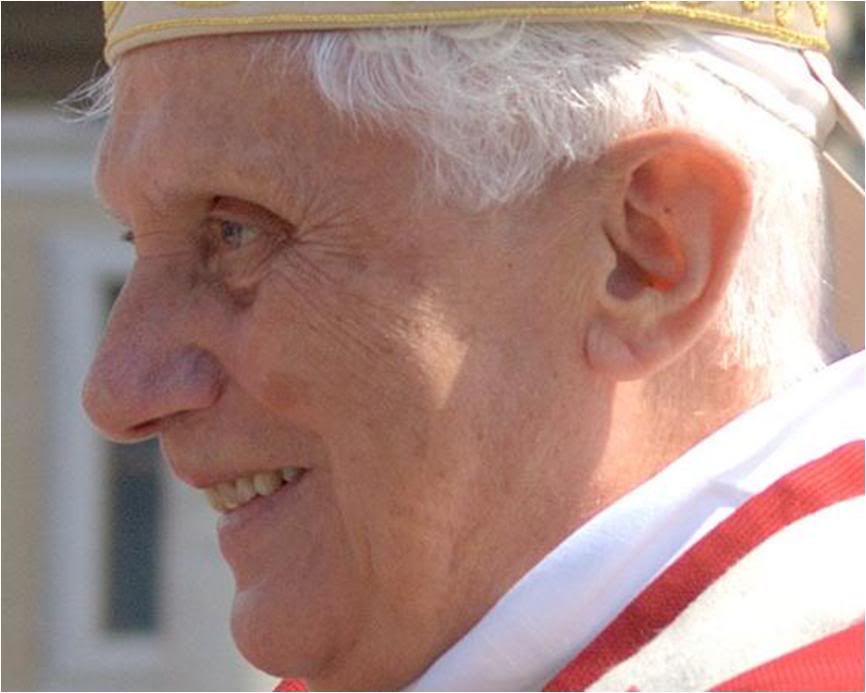 Thanks to Benevolens - one of many great pbotos she took on Palm Sunday
Thanks to Benevolens - one of many great pbotos she took on Palm Sunday
(See the PICTURES & VIDEOS thread).[Modificato da TERESA BENEDETTA 19/04/2009 18:53] |
 19/04/2009 14:37 19/04/2009 14:37 |
|
| | | OFFLINE | | Post: 17.166 | Registrato il: 28/08/2005
| Utente Gold | |
|

 REGINA CAELI TODAY
REGINA CAELI TODAY
The Holy Father led the noontime Regina Caeli prayers today from the inner courtyard of the Apostolic Palace in Castel Gandolfo.
The event was transmitted by satellite to the faithful gathered in St. Peter's Square.
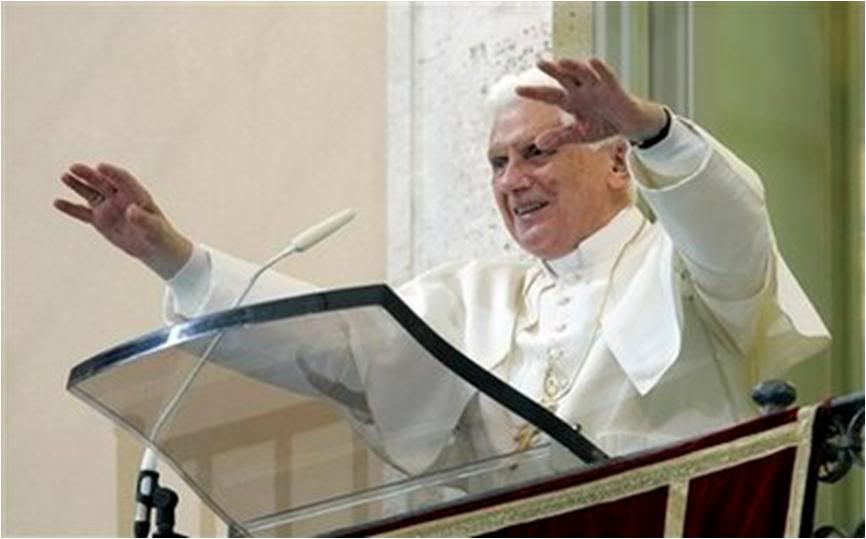
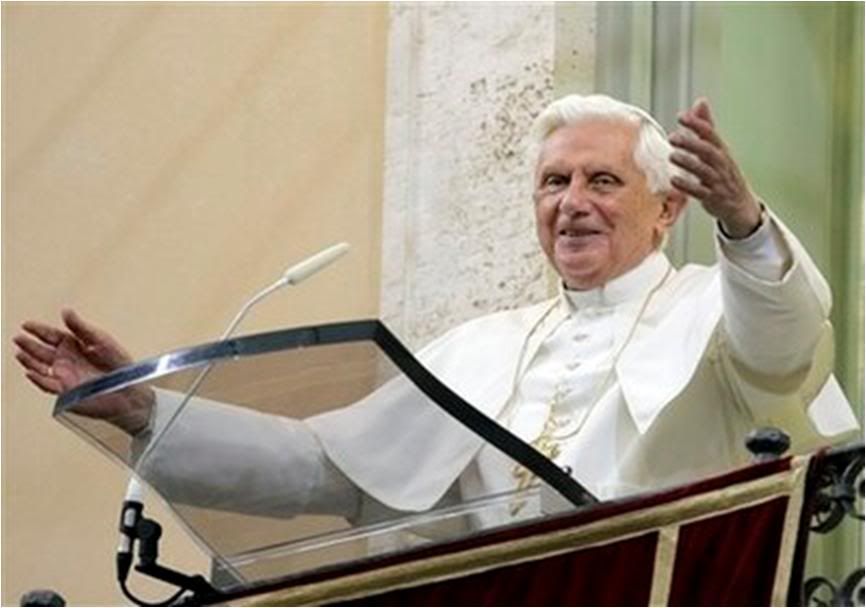
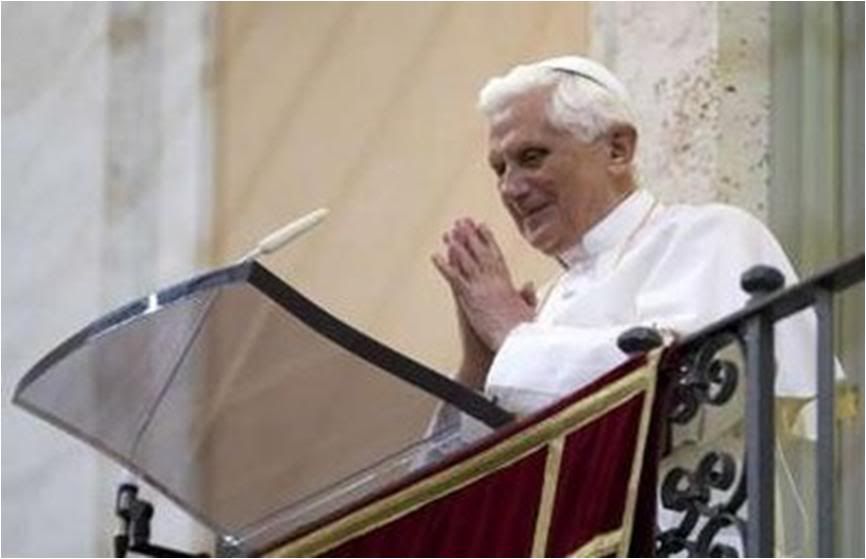 Here is a full translation of the Holy Father's messages today:
Here is a full translation of the Holy Father's messages today:
THE POPE'S WORDS TODAY
Dear brothers and sisters!
To you who are present and all those who are with us through radio and television, I renew my fervent Easter wishes on this Sunday which closes the Octave of Easter.
In the climate of joy which comes from our faith in the risen Christ, I wish to express my most heartfelt 'Thank you' to all those - and there are really so many - who have sent me a sign of affection and spiritual closeness these days, for the Easter festivities, for my birthday on April 16, and for the fourth anniversary today of my election to the Chair of Peter.
I thank the Lord for the chorality of such affection. As I had the occasion to say recently, I never feel alone. Especially in this singular week, which in the liturgy constitutes one single day, I have experienced the communion that surrounds and sustains me as a spiritual solidarity, nourished essentially by prayer, which is manifested in a thousand ways.
Starting with my co-workers in the Roman Curia, to the most geographically remote parishes, we Catholics form and should feel ourselves to be one family, animated by the same sentiments as the first Christian community, of which the text from the Acts of the Apostles read this Sunday says: "The community of believers was of one heart and mind" (Acts 4,32).
The communion of the first Christians had its true center and foundation in the risen Christ. In fact, the Gospel narrates that, at that moment of the Passion, when the divine Master was arrested and condemned to death, the disciples dispersed. Only Mary and the women, with the apostle John, remained together and followed him up to Calvary.
Resurrected, Jesus gave his people a new unity, stronger than before, invincible because it was founded not on human resources but on divine mercy, which made them all feel loved and forgiven by him.
It is God's merciful love that firmly unites the Church, today as yesterday, and that makes mankind one family only - divine love, which, through Jesus crucified and risen, pardons our sins and renews us interiorly.
Inspired by this intimate conviction, my beloved predecessor John Paul II wished to dedicate this Sunday, the second in Eastertide, to the Divine Mercy, indicating to everyone the risen Christ as the source of trust and hope, in accepting the spiritual message transmitted by the Lord to St. Faustina Kowalska, as summarized in the invocation: "Jesus, I trust in you!"
As it was for the first community, is is Mary who accompanies us in life every day. We invoke the Queen of Heaven, knowing that her regality is like that of her Son: all love, merciful love.
I ask you to entrust to her once more my service to the Church, as we say trustingly, Mater misericordiae, ora pro nobis.
After the Regina caeli prayers, he said this:
I address first of all a heartfelt greeting and fervent wishes to our brothers ans sisters in the Oriental Churches who, following the Julian calendar, observe Holy Easter today. May the risen Christ renew in everyone the light of the faith and grant an abundance of joy and peace.
Tomorrow in Geneva, under the auspices of the United Nations, a conference begins to examine the Durban Declaration of 2001 against racism, racial discrimination, xenophobia and relative intolerance.
It is an important initiative because even today, despite the teachings of history, such deplorable phenomena continue.
The Durban Declaration recognizes that "all peoples and persons form a human family, rich in diversity. This has contributed to the progress of civilization and of the cultures that form the common patrimony of mankind... The promotion of tolerance, of pluralism and of respect can lead to a more inclusive society".
On the basis of these statements, firm and concrete action is called for, at the national and international levels, to prevent and eliminate every form of discrimination adn intolerance.
What is needed above all is a vast work of education which exalts the dignity of the human being and protects his fundamental rights. The Church, for its part, reaffirms that only the recognition of the dignity of man, created in the image and likeness of God, can constitute a sure reference for such a commitment.
This common origin, in fact, produces a common destiny for mankind, which must inspire in each and everyone a strong sense of solidarity and responsibility.
I express my sincere wishes that the delegates to the Geneva conference may work together in a spirit of dialog and reciprocal acceptance, in order to put an end to every form of racism, discrimination and intolerance, this marking a fundamental step towards affirming the universal value of the dignity of man and his rights, in a horizon of respect and justice foe every person and people.
In English, he said:
I am happy to greet all the English-speaking visitors present for today’s Regina Coeli prayer, including the group from Dulwich Preparatory School, Cranbrook in Kent.
As we rejoice in the new life that the Risen Christ has won for us, let us renew our resolve to be faithful to our baptismal promises by rejecting Satan and living according to the example of the Lord.
In our prayer we commend our perseverance to the intercession of Mary, Queen of Heaven. Upon all of you I invoke God’s abundant blessings of peace and joy!
He mentioned the anniversary of his election in his French, German and Polish greetings. To the Germans, he said:
On the day of my election as the Successor of Peter four years ago, I asked the faithful to pray for me in my work in the vineyard of the Lord. Today I wish to thank everyone in the German-speaking countries who have supported my pastoral service by their spiritual nearness, and who have expressed this generously in recent days and weeks.
With Mary and the whole Church, let us build a joyful communion with the Risen Christ and entrust our concerns to the mercy of God.
May the Lord bless you and your families.
In Polish, he said:
Today, on Divine Mercy Sunday, I greet in a special way the countrymen of the Servant of God John Paul II. It was he who reminded us all of the message of Christ the Merciful, revealed to St. Faustina.
He exhorted us to bring this message to the entire world. In the face of evil which sows such desolation in the human heart, it is a task that is more relevant than ever.
Let us seek to be witnesses to the merciful love of God. And continuing in Easter joy, on the anniversary day of my election to the Chair of Peter, I thank you all for your prayers in my behalf.
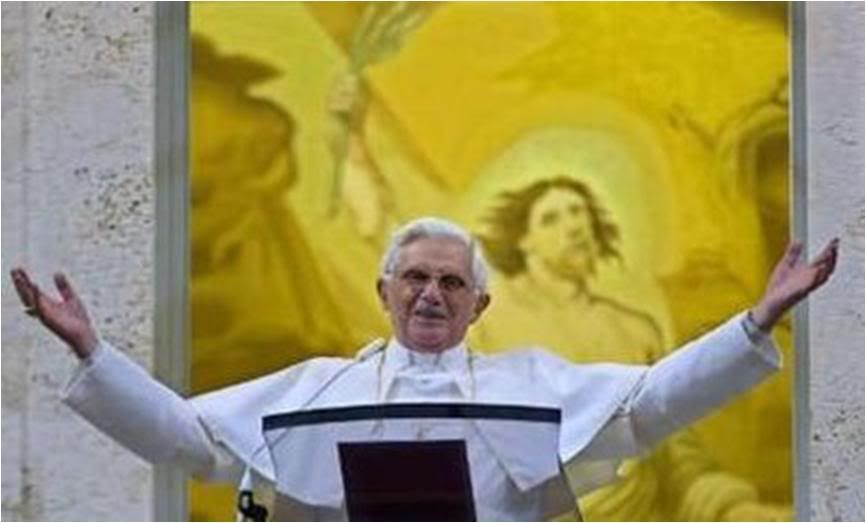
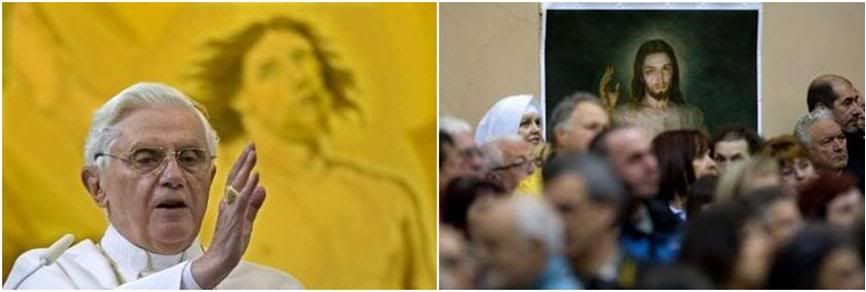
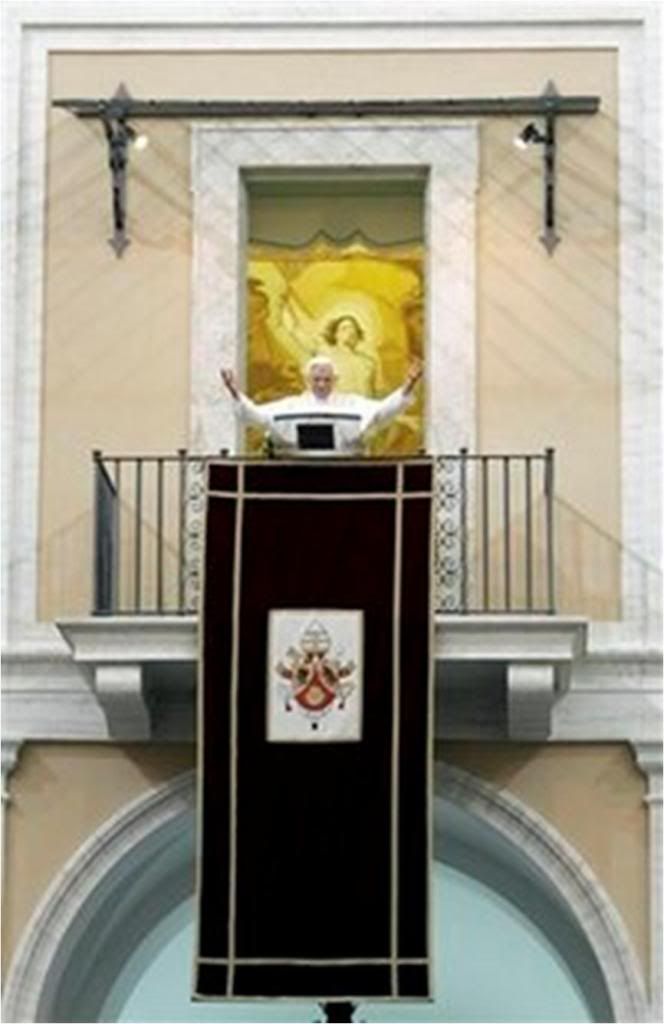 How well he looks! I listened to the broadcast this morning. He sounded very well too - not a single cough, even.
How well he looks! I listened to the broadcast this morning. He sounded very well too - not a single cough, even.

 Pope supports UN conference to review
Pope supports UN conference to review
Durban statement on racism

Castel Gandolfo, April 19 (AsiaNews) - The Holy See is distancing itself from the criticisms of some Western countries, and is giving its support to the UN conference beginning tomorrow in Geneva, reviewing the "Durban Declaration" (2001) "against racism, racial discrimination, xenophobia and related intolerance."
Immediately after the Regina Caeli, recited with the pilgrims at Castel Gandolfo, Benedict XVI called the initiative "important," because "still today, despite the teachings of history, these deplorable phenomena can still be seen."
In recent weeks, the United States, Canada, Italy, and Israel have criticized the declaration because it presented harsh criticisms of the state of Israel, accused of racism toward the Palestinians, and because it defined Zionism as a racist ideology.
After this, the UN commission amended the proposed final text, removing the references to Israel, to Zionism, to the Middle Eastern conflict and other divisive topics, but the United States decided "with regret" to boycott the conference, together with Israel and Canada.
The European Union (EU) would like to find a consensus position. Italy wants to boycott, but Great Britain has already announced that it will send representatives to Geneva.
An appeal to the EU not to boycott the meeting, but to adopt a "constructive" attitude in the name of the fight against racism, xenophobia, and intolerance was issued a few days ago by the Council of Europe's commissioner for human rights, Thomas Hammarberg.
The Pope's position, expressed today, seems to point in the same direction of constructive participation and criticism. ...
[ The rest of the story consists of substantial quotations from the Pope's message].
Pope underscores importance
of UN conference on racism
by Frances D'Emilio

VATICAN CITY, April 19 (AP) – Pope Benedict XVI on Sunday hailed this week's U.N. anti-racism conference and urged countries to join forces to eliminate intolerance, but he made no reference to the U.S. boycott of the meeting.
The conference beginning Monday in Geneva is an important initiative, the Pope said, because "even today, despite the lessons of history, such deplorable phenomena take place."
Some countries are boycotting the meeting to protest language in the meeting's final document that they say could single out Israel for criticism and restrict free speech.
Among those countries is the United States. The State Department said Saturday that the Obama administration would not join the conference "with regret."
But department spokesman Robert Wood said the U.S. was "profoundly committed to ending racism" and would work with all people and nations "to build greater resolve and enduring political will to halt racism and discrimination wherever it occurs."
Italy has also said it would skip the weeklong conference if changes are not made at the last minute. The Netherlands announced on Sunday that it would not go to the conference because some nations are using it as a platform to attack the West.
Benedict said he sincerely hoped that delegates who attend the conference work together, "with a spirit of dialogue and reciprocal acceptance, to put an end to every form of racism, discrimination and intolerance."
Such an effort, Benedict said, would be "a fundamental step toward the affirmation of the universal value of the dignity of man and his rights."
Benedict told pilgrims at the papal vacation retreat in Castel Gandolfo that the declaration, born out of the first world conference on racism in Durban, South Africa, in 2001, recognized that "all peoples and persons form one human family, rich in diversity."
But beyond such declarations, firm and concrete action is needed at national and international levels, he said.
I hope the Vatican decision to take part in the Geneva conference will not trigger another round of accusations from Jewish circles casting doubt on the Pope's position about anti-Semitism!
The Vatican obviously understands that, in the one-nation-one-vote rule of the UN and its organisms, political, religious, ideological or even ethnic (e.g., Arab) blocs can swing any vote if they have the numbers - and in that sense, UN votes are no longer necessarily 'fair'. (Particularly where Israel is concerned, because it is the only Jewish nation in the world, as against the huge Arab bloc and the even larger Muslim bloc. Even the United Satets has only one vote at the UN, although it has veto power in the Security Council.)
Nonetheless, the Vatican has anchored its international foreign policy on working within the UN framework - there being no other comparable international organization - and although it is not a voting member, it can always express its position for or against a decision the UN takes by vote (like the declaration on homophobia}.
[Modificato da TERESA BENEDETTA 24/04/2009 15:24] |
 20/04/2009 14:06 20/04/2009 14:06 |
|
| | | OFFLINE | | Post: 17.173 | Registrato il: 28/08/2005
| Utente Gold | |
|
 PLACEHOLDER FOR UNFINISHED POST
It was a certainty that
PLACEHOLDER FOR UNFINISHED POST
It was a certainty that
 would come up with an appropriate way to commemorate today's anniversary (4/19/09), but since they acquired a new viewing platform last year, it has not always been easy to connect to that platform, and it was not today. I only just got access - and it was worth it.
would come up with an appropriate way to commemorate today's anniversary (4/19/09), but since they acquired a new viewing platform last year, it has not always been easy to connect to that platform, and it was not today. I only just got access - and it was worth it.
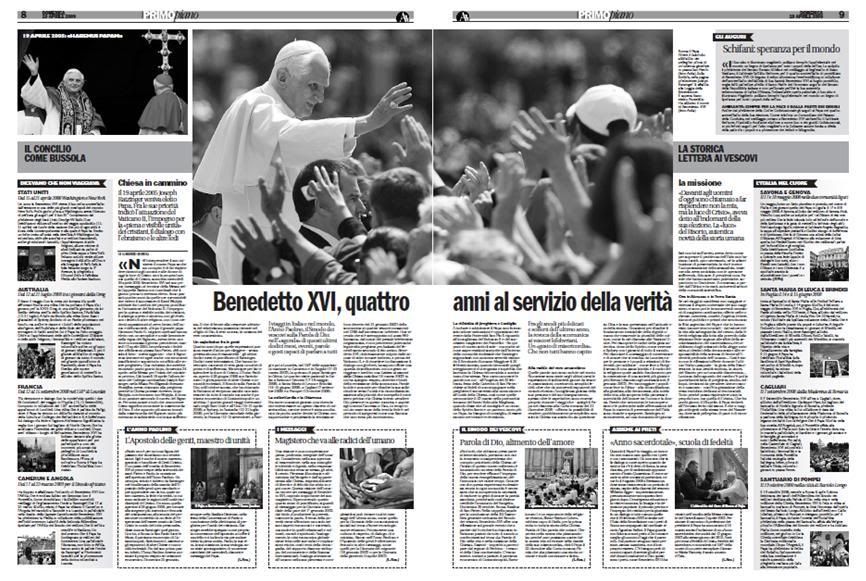 It organizes the material conveniently into a wrap-up report of the past four years, with sidebars on the trips abroad and the pastoral visits in Italy in the past year, as well as special ecclesiastical highlights like the Pauline Year, the Year of the Priest, and the Bishop Synod's Assembly on the Word of God.
It organizes the material conveniently into a wrap-up report of the past four years, with sidebars on the trips abroad and the pastoral visits in Italy in the past year, as well as special ecclesiastical highlights like the Pauline Year, the Year of the Priest, and the Bishop Synod's Assembly on the Word of God.
I will translate the lead story and the editorial for now.
BENEDICT XVI: FOUR YEARS
IN THE SERVICE OF TRUTH
by LORENZO ROSOLI
Translated from

April 19, 2009
On April 19, 2005, Joseph Ratzinger was elected Pope. Among his priorities, he listed the execution of Vatican II decrees, a commitment for 'full and visible' Christian unity, the dialog with Judaism and other religions.
"In undertaking his ministry, the new Pope knows that his task is to make the light of Christ shine before the men adn women of today - not his own light but that of Christ," Benedict XVI said at the end of his first mass as Pope at the Sistine Chapel on April 20 with the cardinals who had elected him he day before.
Four years have passed since those memorable hours which saw the successor to Karol Wojtyla indicate his priorities - to continue to put the teachings of the Second Vatican Council into practice , a commitment to work for 'full and visible' Christian unity, as well as 'open and sincere' dialog with the Jews, the faithful of other religions and with non-believers who desire 'true good' for man and society."
"After the great John Paul II, the cardinals have elected me, a simple and u=humble worker in the vineyard of the Lord," he said emotionally the day before, Tuesday, April 19, before blessing the faithful who had filled up St. Peter's Square.
"I am comforted by the fact," he went on, "that the Lord works even with inadequate instruments and above all, I trust in your prayers."
It was a request he would renew a few days later, on Sunday, April 24, at the Mass to mark the start of his Petrine ministry.
Already, on Monday, April 18, the then dean of the College of Cardinals, Joseph Ratzinger, in the Missa pro eligendo Pontefice, had prayed that the Church might receive, after Papa Wojtyla, the gift of a Pastor that was 'according to the Lord's own heart' - "a Pastor who will guide us to knowledge of Christ, to his love and to true joy".
To announce to all that 'encountering Christ means encountering God's mercy". And that 'the more deeply we are stirred by the Lord's mercy. the greater the solidarity we feel with his suffering".
And that in the face of the growing 'dictatorship of relativism, we can find in the Son of God, true man,"the measure of true humanism".
Four years after those statements, they are helpful to re-read - without presuming to be exhaustive - the last 12 months of papa Ratzinger's Pontificate.
These have been 12 very intense months. In which moments of true joy were interwoven with others of trial and suffering. But always in order to make the light of Christ shine forth.
The Pauline Year, which started on June 28, 2008, with Patriarch Bartholomew I and the representatives of other Christian churches and ecclesial communities. The Synod Assembly on the Word of God last October, during which the world's bishops listened not just to each other but also the Patriarch of Constantinople and to a Grand Rabbi from Israel.
The four international voyages: to the United States and the United Nations (April 15-21), to Sydney, Australia (July 12-21) for World Youth Day; to Paris and Lourdes in France (Sept 12.15) for the 150th anniversary of the Marian apparitions; and earlier this year, to Cameroon and Angola (March 17-23), his first trip to Africa as Pope.
Then, the four pastoral visits in Italy: to Savona and Genoa (May 17-18), to Santa Maria di Leuca and Brindisi (May 17-18), to Cagliari (September 7) and to Pompeii (October 19).
Among so many joyous occasions, a decision which had been meant as a 'discreet gesture of mercy", was instead received, by not a few, including within teh Church, with disquiet and perplexity: the remission (by a decree dated January 21, 2009) of the excommunication of four bishops consecrated by Archbishop Marcel Lefebvre in 1988.
The gesture itself was overshadowed by the 'Williamson case", after one of the four bishops, who had made negationist statements about the Holocaust. ....
[Modificato da TERESA BENEDETTA 20/04/2009 15:06] |
 20/04/2009 14:54 20/04/2009 14:54 |
|
| | | OFFLINE | | Post: 17.174 | Registrato il: 28/08/2005
| Utente Gold | |
|


April 20
 St. Conrad of Parzham (Altoetting, 1818-1894)
St. Conrad of Parzham (Altoetting, 1818-1894)
Bavarian Capuchin
No OR today.
THE POPE'S DAY
The Holy Father met today with
- Cardinal Agostino Vallini, Vicar General of His Holiness for the Diocese of Rome
- Bishops of Argentina (Group 6) on ad limina visit
- Mons. Paul Richard Gallagher, Apostolic Nuncio in Guatemala.
After Regina caeli prayers yesterday in Castel Gandolfo, the Holy Fahter met with
Cardinal Javier Lopez Barragan, who retired last week as President of the Pontifical Council
for Healthcare Workers.
The Vatican released today the program for the Holy Father's visit on April 28
to the earhquake victims of Abruzzo.
[Modificato da TERESA BENEDETTA 21/04/2009 13:57] |
 20/04/2009 16:39 20/04/2009 16:39 |
|
| | | OFFLINE | | Post: 17.175 | Registrato il: 28/08/2005
| Utente Gold | |
|
 PAPA RATZINGER'S PATIENT QUEST:
PAPA RATZINGER'S PATIENT QUEST:
A 'quiet revolution'
characterized by prudence
BY VITTORIO MESSORI
Translated from

April 20, 2009
After having passed his 82nd birthday, Joseph Ratzinger begins the fifth year of his Pontificate.
Once again giving the lie to those who do not know him, the weight of the papal office has not worn him out and he has not lacked the energy for demanding trips like the recent one to Africa. This must come from the strength that he draws from the faith.
I will not forget his expression of surprise when I asked him if he slept well at night when he was Prefect of the Congregation for the Doctrine of the Faith. At the time [summer of 1984], he was outraged at widespread dissent by priests and his desk was piled with disquieting dossiers from all parts of the world.
I was therefore surprised when he answered:
Having examined my conscience and said my prayers, why should I not sleep peacefully? If I would be agitated, then I would not be taking the Gospel seriously which reminds us that each of us is nothing but a 'useless servant'. We should do our duty to the utmost, but always aware that the Church is not ours, the Church is of Christ, who wants to use us as instruments but remains the only Lord and leader. We will be asked to account for our efforts, not for the results.
It is in this spirit that he accepted the weight of the Pontificate: out of obedience, out of love for the Church, just as when he was a young professor, he accepted without whining when Paul VI wrenched him away from his beloved university life to make him lead the major diocese of Munich.
Passing likewise, in April 2005, to a new desk - just a few hundred meters across St. Peter's Square from that he had occupied for 24 years - has not changed his style, which is characterized by constancy and patience, with a very German background of seriousness, precision and sense of duty.
He had clearly manifested in 1985 what would turn out to be his program as Pope in 1985 in Rapporto sulla fede: a 'reform of the reform', with a return to the 'true' Vatican II, not the imaginary one of the vociferous so-called progressivists.
He meant full faithfulness to the documents of the Council, not to a presumed, imprecise 'spirit of the Council', and therefore, continuity, not rupture, with the history of a Church that does not have a before and after.
A clear objective, which he pursued first as the principal theological adviser to John Paul II, with whom, nonetheless, he was not always in tune.
The loyal friendship between the two, which quickly became affection, did not prevent the Cardinal's perplexity at certain papal initiatives like the syncretistic displays at Assisi, the apologies for the sins of Catholics in the past, the proliferation of trips usually at the expense of the daily administration of the Church, the number of beatifications and canonizations, the spectacularization of religious events (at one time with actual rock stars on stage], and the choice of liturgical vestments according to what TV producers thought best.
Mourning his venerated friend and having taken his place, even if he never wished it, and having thus become Benedict XVI, Joseph Ratzinger has continued his patient labors. It is an adjective not chosen at random.
Indeed, patience has always characterized him: out of respect for persons; out of Christian realism that knows how much tenacity is necessary in order to change things; out of awareness that the Church has history on its side and that its rhythms are not those of 'the world'.
Thus, both those who feared and those who wished a blitz in the liturgical 'reform of the reform' - which, according to the then Cardinal Ratzinger, was among the most necessary and even most urgent changes - were thrown off by his timing in this respect.
His 'quiet revolution' did not begin with any decree for the universal Church. but by his choice of a new master of pontifical liturgical celebrations in a liturgist whose ideas are congenial to his. [Messori is wrong here, because Summorum Pontificum in July 2007 preceded the naming of Mons. Guido Marini in October 2007. Of course, the Pope has not himself celebrated the traditional Mass in public since the motu proprio, but he has introduced 'minor' but significant changes and details in his own celebrations of the Novus Ordo. ]
Thus, he signalled a return to liturgical rites in the traditional line by setting the example at this highest level. If the Pope celebrates Mass this way, should not the bishops and the parish priest, sooner or later, follow his example?
Patience, and prudence, is also seen in the matter of the language of liturgy - not replacing the Missals, but using Latin alongside the vernacular [as the Vatican-II liturgical constitution Sacrosanctum concilium clearly states] to demonstrate in this way that Vatican II was not a rupture with Tradition and that St. Pius V was not any less Catholic than Paul VI. [What a striking way to express this!]
He has shown the same patience with ecclesiastical nominations. He has not really 'upset' anything, but the attentive observer will not miss replacements an nominations that show a prudent strategy that is also incisive.
But this Pontificate will not be truly understood without taking into consideration that for Joseph Ratzinger, the problem of problems is not the ecclesial 'machine', but the fuel for it - not the Apostolic Palace, but its foundations.
And that is the faith which knows itself threatened at the roots, the faith which many believe is incapable of standing up to the assault of reason, that faith which is besieged on all sides by doubt.
The crisis for the Church is more than that of its organisms, but of the truth of the Gospel which sustains it and gives it sense.
Joseph Ratzinger told me once: "We are at a point when I myself am surprised at those who continue to believe, not at those who do not believe".
It is a dramatic statement which provides a background for a Pontificate whose focus, not by chance, is the search (a patient one) for a new relationship between contemporary reason and an ancient faith.
![[SM=g27812]](https://im0.freeforumzone.it/up/0/12/5757084.gif) ![[SM=g27812]](https://im0.freeforumzone.it/up/0/12/5757084.gif) ![[SM=g27812]](https://im0.freeforumzone.it/up/0/12/5757084.gif) ![[SM=g27812]](https://im0.freeforumzone.it/up/0/12/5757084.gif) ![[SM=g27812]](https://im0.freeforumzone.it/up/0/12/5757084.gif) ![[SM=g27812]](https://im0.freeforumzone.it/up/0/12/5757084.gif) ![[SM=g27812]](https://im0.freeforumzone.it/up/0/12/5757084.gif) ![[SM=g27812]](https://im0.freeforumzone.it/up/0/12/5757084.gif) ![[SM=g27812]](https://im0.freeforumzone.it/up/0/12/5757084.gif) ![[SM=g27812]](https://im0.freeforumzone.it/up/0/12/5757084.gif) ![[SM=g27812]](https://im0.freeforumzone.it/up/0/12/5757084.gif) ![[SM=g27812]](https://im0.freeforumzone.it/up/0/12/5757084.gif) ![[SM=g27812]](https://im0.freeforumzone.it/up/0/12/5757084.gif) ![[SM=g27812]](https://im0.freeforumzone.it/up/0/12/5757084.gif) ![[SM=g27812]](https://im0.freeforumzone.it/up/0/12/5757084.gif) Richard Owen quotes from Messori's article above in his own four-year 'review' of the Benedictine Pontificate thus far. But not surprisingly, Owen builds his entire article on a mistaken, fallacious and thoroughly prejudiced premise - projecting his own run-of-the-mill propensities onto Benedict XVI who inhabits a completely different plane of existence from him!
Is the Pope looking forward to a better year?
Richard Owen quotes from Messori's article above in his own four-year 'review' of the Benedictine Pontificate thus far. But not surprisingly, Owen builds his entire article on a mistaken, fallacious and thoroughly prejudiced premise - projecting his own run-of-the-mill propensities onto Benedict XVI who inhabits a completely different plane of existence from him!
Is the Pope looking forward to a better year?
by Richard Owen in Rome

April 20, 2009
As he enters the fifth year of his pontificate, Pope Benedict XVI is clearly hoping to put the "mishaps" of his fourth papal year behind him.
Bringing the Easter calendar to an end yesterday at Castel Gandolfo, the papal residence south of Rome, before returning to Rome, he beamed as he was greeted with cheers and applause for the anniversary of his election in succession to John Paul II, and his birthday last week, when he turned 82.
He said he "never felt alone", thanks to support from the Curia in Rome (the Vatican hierarchy) as well as "far flung parishes", and thanked God for the "chorus of so much affection".
Next week, he will go to Abruzzo to pray for the victims of the earthquake, and the week after that he heads for the Holy Land to bring a message of reconciliation and peace. He is about to release his third encyclical, on globalisation and poverty.
He has begun changes in the Curia, replacing Javier Lozano Barragan, the Vatican's Mexican "health minister", who has reached the retirement age of 75, with Monsignor Zygmunt Zimowski, a Polish prelate with whom the Pope worked when he was head of Vatican doctrine.
He is also busy finding replacements for other senior officials who have reached or exceeded retirement age, including Cardinal Renato Raffaele Martino, head of the Council for Justice and Peace, likely to be succeeded by Monsignor Diarmuid Martin, the astute and able Archbishop of Dublin.
But apart from Monsignor Martin, there is little sign the Pope is gathering around him the kind of team of young, forward-looking, media-savvy men who can help him avoid further "mishaps".
The revealing remark about "not feeling alone" echoes a similar assertion on the plane to Cameroon last month at the start of his trip to Africa. He was reacting to suggestions that his remote, scholarly style had led to the public relations disaster of his decision in January to lift the excommunication of Richard Williamson, a Holocaust-denying ultra-conservative bishop.
[Why does he make it sound as if the Pope's assertions were somehow dubious? This spurious theory by Vaticanistas that he is isolated because he does not keep a near-perpetual open house in the papal apartments as John Paul II did is the most outrageous crap.
It means nothing to them that he happens to be one of the rare Popes in modern times who has a living relative - a brother who is almost like a twin to him - and counts many friends who date back to when he was a seminarian, and many more formed by professional and personal ties in the past five decades, with whom he apparently keeps in touch; nor that he spends so much time sitting down with visiting bishops - he's still seeing Argentine bishops on ad-limina visit three weeks since he sat down with the first group - from around the world. All that counts for nothing - they still say he is isolated. You'd think he never reads newspapers or watches TV. How is their wilful denial of reality any different from Bishop Williamson's negationism?]
Yet the African trip itself produced another PR debacle, in the form of the Pope's assertion that condoms "aggravated" the fight against Aids by encouraging sexual promiscuity.
Many in the Church were also dismayed by Benedict's appointment - lately rescinded - as Bishop of Linz in Austria of Father Gerhard Maria Wagner, who had said Hurricane Katrina was retribution for sin in New Orleans.
Supporters of Pope Benedict are fighting back. Cardinal Angelo Bagnasco, head of the Italian Bishops Conference, said the attacks on the Pope had been "offensive and unacceptable". Last week, in a direct counter-attack over the Pope's views on condoms, the Vatican accused Belgium of trying to "intimidate" him.
The Pope, says Vittorio Messori, a Catholic writer close to the Vatican, has carried out a "quiet revolution". As a cardinal, Benedict was "perplexed" by the way John Paul II kept appearing on stage with rock stars, apologising for the Church's past errors and making an "excessive" number of saints, Messori said. He had instead "returned to tradition".
But despite this backing chorus, criticism of Benedict's pontificate comes not only from outside the Church but also from within it. When he was elected, recalls Giovanni Maria Vian, editor of L'Osservatore Romano, the Vatican newspaper, Benedict said he was not afraid of "the wolves", referring to St John's Gospel.
"But the most dangerous wolves are inside the Church itself - the wolves in sheep's' clothing," Mr Vian said. It was they who had projected a "false image" of the Pope as isolated from ordinary life, when in fact he was "a good shepherd" with a "realistic vision of the world". [And I am almost 100% certain that when Benedict XVI spoke of wolves, he meant those wolves in priest's clothing within the Church above all!]
In February, at the height of the Holocaust denial row, the Pope asked the faithful to help him "bring unity to the Church", expressing his personal pain at being attacked by Catholics. He said his job was to "protect legitimate differences while at the same time assuring that such differences do not hinder unity but contribute toward it".
Not easy. As Father Enzo Bianchi, prior of the ecumenical monastery at Bose in Piedmont, perceptively puts it, Benedict is right to assert core Christian values in the face of materialism and secularism - but if he is seen as "intransigent" on social and ethical issues, this creates "anti-clericalism dangerous to the very survival of Christianity", thus creating a "vicious circle".Perhaps Father Bianchi should be made a cardinal.
 I chose not to translate the article by Bianchi from which Owen quotes, because it all but advocates that the Pope give in and yield on certain Christian principles in order to keep the peace, as it were.
I chose not to translate the article by Bianchi from which Owen quotes, because it all but advocates that the Pope give in and yield on certain Christian principles in order to keep the peace, as it were.
I can find no online biography of Bianchi in English, but as far as I can tell from what there is in Italian - including an article about him by Sandro Magister a few years back - he is not even a priest, although he presumably was born Catholic.
He studied economics in college, not theology. He started his so-called monastery of Bose, of which he is the prior, as an exercise of ecumenism and the 'spirit of Vatican II', after three years of living a life of celibacy, prayer and work with some university friends. This became the basis for the ecumenical community at Bose - which has counted Bartholomew I among its visitors, and Vatican prelates like Piero Marini and Renato Boccardo among its 'regular' retreatees.
The 2005 article by Magister on Bianchi was occasioned by one of Bianchi's periodic 'Letter to Friends' in which he "denies that there is an attack underway in Europe against the Church and Christians, that there has been no such attack in the past – 'for centuries Christians have lived freely and been respected' – and much less is there one today. In his opinion, it is rather the Church that stubbornly insists upon retaining its privileges and its close ties with the dominant powers".
That soured me on Bianchi for good. Especially after finding out that he became the president of the infamous Bologna school that virtually 'invented' the so-called Spirit of Vatican-II and is on the board of the journal Concilium, the progressivists' magazine that Von Balthasar, De Lubac and Ratzinger left early on to form the orthodox theologians' outlet, Communio.
That's the man someone like Owen would want to be a cardinal. No wonder.
![[SM=x40796]](http://www.vocinelweb.it/faccine/mad/pag4/51.gif) ![[SM=x40796]](http://www.vocinelweb.it/faccine/mad/pag4/51.gif) ![[SM=x40796]](http://www.vocinelweb.it/faccine/mad/pag4/51.gif) ![[SM=x40796]](http://www.vocinelweb.it/faccine/mad/pag4/51.gif) ![[SM=x40796]](http://www.vocinelweb.it/faccine/mad/pag4/51.gif) ![[SM=x40796]](http://www.vocinelweb.it/faccine/mad/pag4/51.gif) ![[SM=x40796]](http://www.vocinelweb.it/faccine/mad/pag4/51.gif) ![[SM=x40796]](http://www.vocinelweb.it/faccine/mad/pag4/51.gif) ![[SM=x40796]](http://www.vocinelweb.it/faccine/mad/pag4/51.gif) ![[SM=x40796]](http://www.vocinelweb.it/faccine/mad/pag4/51.gif) ![[SM=x40796]](http://www.vocinelweb.it/faccine/mad/pag4/51.gif) ![[SM=x40796]](http://www.vocinelweb.it/faccine/mad/pag4/51.gif) ![[SM=x40796]](http://www.vocinelweb.it/faccine/mad/pag4/51.gif) ![[SM=x40796]](http://www.vocinelweb.it/faccine/mad/pag4/51.gif) ![[SM=x40796]](http://www.vocinelweb.it/faccine/mad/pag4/51.gif) There's an even more hateful and rather pathetic article in the National Catholic Reporter today by perennial dissident Richard McBrien of 'Notre Shame' who files an article entitled "Four years of Benedict XVI" in which all he does is quote from Marco Politi's egregiously unobjective anti-Benedict screed published by the Tablet - British liberal Catholicism's cesspool of venom - on March 21, as though Politi's word were Gospel truth.
There's an even more hateful and rather pathetic article in the National Catholic Reporter today by perennial dissident Richard McBrien of 'Notre Shame' who files an article entitled "Four years of Benedict XVI" in which all he does is quote from Marco Politi's egregiously unobjective anti-Benedict screed published by the Tablet - British liberal Catholicism's cesspool of venom - on March 21, as though Politi's word were Gospel truth.
[Modificato da TERESA BENEDETTA 21/04/2009 15:30] |
 20/04/2009 19:51 20/04/2009 19:51 |
|
| | | OFFLINE | | Post: 17.176 | Registrato il: 28/08/2005
| Utente Gold | |
|
 Dates given for Pope's visit
Dates given for Pope's visit
to the Czech Republic

PRAGUE, April 20 (CTK) - Pope Benedict XVI will visit the Czech Republic probably on September 26-28, Bohemian and Moravian bishops say in a pastroal letter, though the Vatican has not yet confirmed the date, because they consider it important to start preparations, Irena Sargankova said.
Sargankova, spokeswoman for the Czech Bishops' Conference (CBK), said the pastoral letter was reAd during divine services on Sunday.
The CBK has been working for the Pope's visit to take place around September 28 when the country commemorates St Wenceslas, the saint patron of Czechs.
Pavel Vosalik, Czech ambassador to the Vatican, told CTK by phone last week that the end of September appears to be "one of the possible" dates of the Pope's visit.
The bishops say preparations for the arrival of Benedict XVI will start five months beforehand.
Next Sunday, for instance, money for the visit will start to be collected in all Czech Catholic churches.
The bishops also call for spiritual preparation that will focus on faith, hope and love as the "the cornerstones of Christian identity."
Czech Foreign Minister Karel Schwarzenberg also discussed the preparation for the Pope's visit when he had a brief meeting with Benedict XVI after the General Audience last Wednesday.
He said the Pope expressed great interest in the situation in the Czech Republic and the position of the Czech Catholic Church.
The final decision on the date will be up to the Pope. In any case, the date must also fit Czech President Vaslav Klaus's schedule and, obviously, the agreement of the Czech bishops' conference.
Klaus is to visit the Vatican at the end of May.
Benedict XVI's predecessor John Paul II visited the Czech Republic three times, the last time in 1997.
In making the initial announcement last January on the Pope's visit, Czech Cardinal Miloslav Vlk said the visit is being made at the Pope's own initiative.
He said the main part of the Pope's visit is to take place in the eastern part of the country, Moravia, where some three-fourths of Czech Christians live.
Benedict XVI's visit will also be a state visit, he noted. As a result, the Czech Bishops' Conference has been closely cooperating with the Presidential Office.
Vlk said Czech President Vaclav Klaus will probably meet the Pope at Prague Castle.
Czech representatives have not yet signed an agreement with the Vatican to define the position of the Roman Catholic and Greek Catholic churches in the Czech Republic [which for over 50 years, was a Soviet satellite state governed by an officialy atheistic Communist Party].
The Vatican has ratified the document but the Czech Parliament rejected it.
Vlk said he believed Czech ambassador to the Vatican, Pavel Vosalik, was interested in making progress on the issue or even solving it.
[Modificato da TERESA BENEDETTA 20/04/2009 20:22] |
 20/04/2009 22:00 20/04/2009 22:00 |
|
| | | OFFLINE | | Post: 17.177 | Registrato il: 28/08/2005
| Utente Gold | |
|
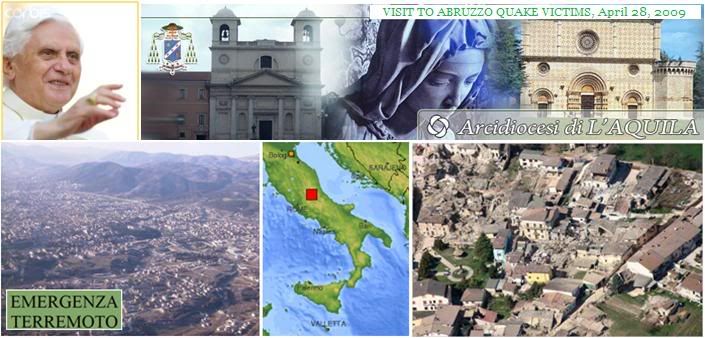 VISIT OF THE HOLY FATHER
VISIT OF THE HOLY FATHER
TO THE EARTHQUALE-AFFECTED AREA
IN ABRUZZO, April 28, 2009
PROGRAM
09.00 Departure from the Vatican heliport.
09.30 Arrival at landing zone near the Onna temporary shelter.
VISIT WITH THE VICTIMS
Greeting from the Holy Father
and Prayer for the Dead
10.00 Departure for L'Aquila city center by car.
VISIT TO TBE DAMAGED BASILICA OF COLLEMAGGIO
The Holy Father will venerate the urn of Pope Celestine V
and will leave a Pontifical Pallium in homage.
BRIEF VISIT TO THE DAMAGED STUDENT HOUSING
Meeting with student representatives.
10:45 Arrival at the Finance Guard barracks in Coppito
THE HOLY FATHER GREETS THE MAYORS AND PARISH PRIESTS
of the towns most severely affected by the earthquake.
11.00 MEETING WITH THE FAITHFUL AND AID AND RESCUE PERSONNEL
(Volunteers, Civil Protection, Military, Firemen, Health Workers, etc)
- Greeting by Mons. Giuseppe Molinari, Archbishop of L'Aquila
- Greeting by the Hon. Massimo Cialente, Mayor of L’Aquila.
- Address and Prayer by the Holy Father
- Recital of the Regina Caeli.
(This will be done in front of the statue of the Madonna di Roio*,
also known as Our Lady of La Croce, before which the Holy Father
will offer a Golden Rose.)
- Greeting by the Holy Father to all the representatives of various categories
involved in the recovery work.
12.00 Departure by helicopter from Coppito.
The Holy Father will be flown over the earthquake zone
to see the extent of the damage.
13.00 Arrival at the Vatican heliport.
* I had to look up information about the Madonna di Roio, and it is one of those fascinating stories that abound in religious literature, but I have not found any references in English.
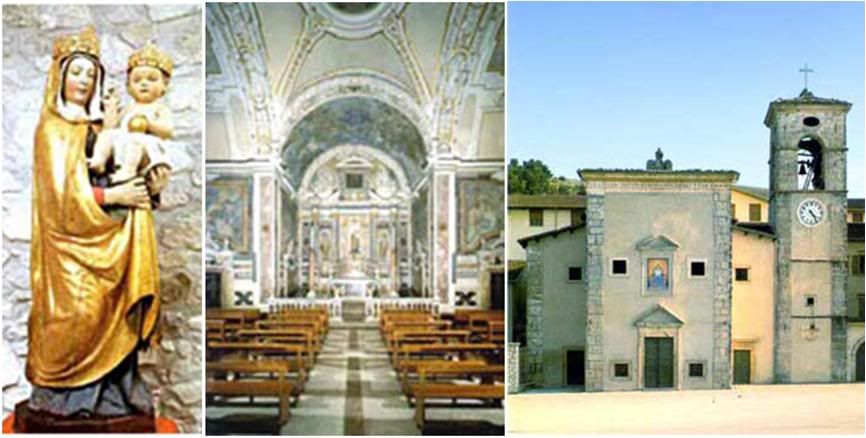 The image and the sanctuary in Poggio di Roio, a village of L'Aquila.
The image itself is a lifesize wooden statue dating to the 14th century, but the story goes that it was found in 1548 by a shepherd from Abruzzo who was pasturing sheep in neighboring Puglia where it was the custom to bring the flocks in winter.
The image and the sanctuary in Poggio di Roio, a village of L'Aquila.
The image itself is a lifesize wooden statue dating to the 14th century, but the story goes that it was found in 1548 by a shepherd from Abruzzo who was pasturing sheep in neighboring Puglia where it was the custom to bring the flocks in winter.
The shepherd lost one of the flocks he was grazing and prayed to the Virgin to help him in his plight. She appeared to him with the Baby Jesus in her arms, telling him where his sheep had found refuge. Going back to the site of the apparition later with other shepherds to whom he told the story, it is said they found the statue.
With the warmer weather, they headed back to the Abruzzo, bringing the statue home with them, on a mule. Nearing their destination, the mule suddenly dropped to its knees just opposite a Cross in front of the Castle of Roio and refused to go farther. So they took the statue on their shoulders and carried it to the nearby Abbey of St. John. The following day, to their surprise, the statue was no longer there - the people of Roio found it in front of the Cross where the mule had stopped. They gratefully took custody of it and eventually built a sanctuary for it.
[Modificato da TERESA BENEDETTA 20/04/2009 23:57] |
 21/04/2009 03:33 21/04/2009 03:33 |
|
| | | OFFLINE | | Post: 17.178 | Registrato il: 28/08/2005
| Utente Gold | |
|
 Only a tempest of truth
Only a tempest of truth
can save Europe from conformism
by GIULIANO FERRARA
Translated from

April 20, 2009
I have always found Belgium unappealing. As an entity that is - for the geographical error that it is. As a liguistic and cultural ambiguity. As a country that has tended to mediocre solutions.
And yet my grandmother and great-grandmother are Flemish. And Brussels is in many ways a hospitable city.
But what mean-psiritedness in this ridiculous arrogance of teh Belgian parliament whose House of Deputies passed a near-unanimous condemnation of the Pope for a 'crime of opinion', for having said that condoms are not the only answer to AIDS and that they, in fact, could aggravate the problem.
The pastor of the universal Church has no right to think and express himself freely? Other free opinions have not condemned him for this [not for saying it, but for what he said] but a formal act of censure from a Parliament does - a gesture of political intimidation.
Belgium's principal deliberative organ of course has a history of sanctioning the Union Miniere, Belgium's great Congo monopoly which was responsible for the most sordid and violent expressiona of colonialism, would now presume to tell the missionary church in Africa and Albert Schweitzer's brand of Christianity, that in Africa, the problem is not to provide Africans with an autochtonous education along with adult, responsible sexuality founded on love and mutuakl giving, on a disciplined emotional and familial life, rather than on promiscuity and the most svage kind of sxual-genital commerce - rather, that Africa should be flooded with condoms. And never mind what the results have been.
And yet, the parliamentary resolutuion from Brussels accuses the Pope of indifference to human life!
And that is the very caricature of an ethical state. The formal transformation of negative, obstructive secularity into parascientific dogma: the Belgian lawmekers would invite others to think as they do, not according to one's culture , much less to the words of the Pope.
Even as John Miklethwait and Adrian Wooldridge - two of the most intelligent and informed journalists on the scene today - tell us God is coming back, God is Back, acfcording to their latest book.
And he is back even in Europe, even on the continent where conformist logic has prevented religious culture to find room in the market and live in competition among free churches that are nonetheless separate from the state, as in the American model.
Against such conformism, only God can save us. Against the ideological claims of political castes who have emerged from nothing - and can only go back to nothing - only a new religious spirit can protect us.
Europe would need a tempest of truth, something that goes far beyond the normal Magisterium of a great Church, something strongly 'revelatory', something which can shake it up out of the torpor left behind after its two great self-inflicted ordeals of the 20th century: Nazism with its Holocaust and Communism [whose human holocaust registered far greater numbers].
*********************************************************************
I would like to believe that Benedict XVI is providing the one-man 'tempest of truth' so far, with support - news of which needs to be far better amplified in the Western media - from the Greek Orthodox Patriarchate of Constantinople and the Russian Orthodox Patriarchate of Moscow.
The Anglicans are too divided and conflicted over the secular accomodations that their more liberal members would allow to dilute traditional Christian teaching. And almost all the Protestant denominations, of course, have long been in favor of articifial contraception and abortion on demand, while world Protestant federations have generally not taken clear and/or forceful stands - much less unanimous - on other outstanding social issues like euthanasia and gay marriage.
Who knows, the white-haired soft-spoken prophet at the Vatican may yet prove to be that Biblical 'revelatory' force that will jolt Europe out of its self-induced torpor.
[Modificato da TERESA BENEDETTA 21/04/2009 03:34] |
 21/04/2009 05:30 21/04/2009 05:30 |
|
| | | OFFLINE | | Post: 17.179 | Registrato il: 28/08/2005
| Utente Gold | |
|
 The title given to this item is one of those facile but fallacious generalities that editors and journalists like to make. Benedict XVI may have appointed a few of his former associates at CDF to become heads of Curial discasteries but that does not make them 'shape' his Papacy in any way.
The title given to this item is one of those facile but fallacious generalities that editors and journalists like to make. Benedict XVI may have appointed a few of his former associates at CDF to become heads of Curial discasteries but that does not make them 'shape' his Papacy in any way.
He alone shapes his Papacy - and it is not they who wield influence on him, but the other way around! By the same token, it wouid have been fallacious to say that Cardinal Ratzinger, no matter how 'powerful' and influential he was as the Church's chief theologian, 'shaped' John Paul II's papacy.
Former doctrinal aides
shape Pope Benedict's papacy

Apr. 19, 2009
During the John Paul years, Vatican insiders talked about a “Polish mafia” in Rome, meaning a cluster of Poles who wielded influence on the late pope. Four years into the reign of Benedict XVI, there’s no analogous gang of Germans, but the Pope has quietly assembled another sort of posse: Former aides from the Congregation for the Doctrine of the Faith, where then-Cardinal Joseph Ratzinger ran the show for 24 years.
With tongue firmly planted in cheek, one might say that instead of a Polish mafia, Benedict is now surrounded by his “Holy Office homeboys.”
(The Congregation for the Doctrine of the Faith, the Vatican’s top doctrinal agency, was once called the “Holy Office, and around Rome it’s still a common shorthand.)
On April 18, Benedict XVI named Bishop Zygmunt Zimowski of Radom, Poland, to succeed Mexcian Cardinal Javier Lozano Barragán as President of the Pontifical Council for the Pastoral Care of Health Care Workers. Zimowski worked in the Congregation for the Doctrine of the Faith from 1983 to 2002; when he went home to become a bishop, Ratzinger travelled to Poland for the consecration ceremony.
Zimowski’s appointment brings to four the number of important Vatican offices run by former Ratzinger aides:
- The Secretariat of State, headed by Italian Cardinal Tarcisio Bertone, who served as Ratzinger’s deputy from 1995 to 2002;
- The Congregation for the Doctrine of the Faith, led by American Cardinal William Levada, who worked under Ratzinger in the early 1980s and later became a bishop member of the congregation;
- The Congregation for the Causes of Saints, led by Archbishop Angelo Amato, who served as a consultor to the CDF before replacing Bertone as Ratzinger’s deputy from 2002 until 2008;
- The Pontifical Council for the Pastoral Care of Health Care Workers, how presided over by Zimowski.
The number rises to five if one also includes the Pontifical Council for the Laity, where Ratzinger’s former private secretary and close friend, Bishop Josef Clemens, is the number two official.
[He surprisingly omits Cardinal Antonio Canizares, now Prefect of the Congregation for Divine Worship, who was for years a conculting theologian for the CDF,w hich is where Cardinal Ratzinger got to know him well.]
As for Zimowski, the Pope’s affection has long been clear. The two men took a helicopter together from Warsaw to Radom for the consecration in 2002, where the future Pope said in his homily, “You know how much we in Rome awaited this day. We were all convinced that this was the will of God, to confer on you such a responsibility in the church.”
In turn, one of Zimowski’s first acts as bishop was to establish a center for doctoral and post-graduate study of Ratzinger’s theology at a local university.
It is also thanks to Zimowski that the world learned of the Pope’s fondness for pancakes with marmalade, an insight Zimowski gleaned while travelling with Ratzinger in the Tyrol, and which he revealed in an interview with Polish journalists shortly after his mentor’s election to the papacy. [This fact was also mentioned in pre-Papal articles about Cardinal Ratzinger's visits to Bressanone, where he favored pancakes with myrtle jam.]
At first blush, Benedict’s preference to entrust important posts to people he knows might seem like little more than common sense. Moreover, at 82, the Pope is probably disinclined to spend time adjusting to the personalities and rhythms of complete unknowns.
Yet in the culture of the Vatican, all this does have broader significance.
Traditionally, the Roman Curia has been a blend of two kinds of personalities, symbolized by two ultra-powerful departments: the Secretariat of State, composed of diplomats; and the Holy Office, populated by the guardians of orthodoxy.
The former tend to prize flexibility, pragmatism, and moderation; the latter put a premium on clarity and solid roots in traditional Catholic identity. The default question of the diplomats tends to be how the Church can explain itself to the outside world, while the Holy Office’s main concern is generally that the Church stays true to itself.
Since the era of Pope Paul VI, the consensus has been that the Secretariat of State held the upper hand in the corridors of power. Admirers believe that arrangement afforded the Vatican a realistic view of the world, and a capacity to adapt to changing circumstances. Critics say it sometimes fudged core matters of Catholic identity.
However one slices it, the reality is that Pope Benedict’s “Holy Office homeboys” are now in the ascendant. On balance, that implies a Vatican team more focused on ensuring that the church follows her own logic and speaks her own language, rather than adapting to the psychology and argot of secular modernity.
One consequence is that, at times, Vatican decisions and statements may be more opaque to people who aren’t steeped in the thought-world of the church – an insight that may go a long way towards explaining the Vatican’s recent difficulties in explaining papal moves such as reviving the old Latin Mass, or lifting the excommunications of four traditionalist bishops, including one who is a Holocaust denier.
Zimowski takes over the Vatican’s top job for health at a moment in which relations with secular circles seem especially tense, especially in the wake of a European furor related to Benedict XVI’s comments on condoms and AIDS en route to his recent swing in Africa.
Three days before Zimowski’s appointment was announced, Archbishop Dominique Mamberti, the Vatican’s foreign minister, received the ambassador to the Holy See from Belgium, who delivered an official protest against the Pope’s comments adopted by the Belgian parliament.
A testy note released later that day by the Secretariat of State complained of an “unprecedented media campaign” against the Pope in Europe, based upon selective quotations that it called “truncated, isolated and lifted out of context.”
The statement said that the full version of the Pope’s comments indicate a two-pronged approach to AIDS: first, the “humanization of sexuality,” and second, “friendship and presence for suffering people.” That position, the statement asserted, has been “appreciated by Africans and by true friends of Africa.”
Among other challenges, Zimowski thus inherits the task of defending Catholic teaching on reproductive health in a European context marked by increasing skepticism and, at times, overt opposition. His success may depend on how well he’s able to blend his training and experience in the Holy Office with a little bit of diplomacy too.
 If what Allen means by 'diplomacy' is political correctness, then he is wrong. The Vatican - both as the Pope's state and as the worldly representative of the Church - cannot be politically correct at the expense of Catholic principle.
If what Allen means by 'diplomacy' is political correctness, then he is wrong. The Vatican - both as the Pope's state and as the worldly representative of the Church - cannot be politically correct at the expense of Catholic principle.
And the field of reproductive health encompasses many of the non-negotiable issues for the Church. It is not possible to fudge these issues in any way: one is either for or against certain things. No amount of diplomacy can gloss over that.
[Modificato da TERESA BENEDETTA 22/04/2009 02:10] |
 21/04/2009 06:54 21/04/2009 06:54 |
|
| | | OFFLINE | | Post: 17.180 | Registrato il: 28/08/2005
| Utente Gold | |
|
 The story on Vatican participation in the Geneva conference of the United Nations following through on the 2001 Durban conference against racism, discrimination and intolerance, has now taken a journalistic life of its own. So I have decided to take out the following developments from the P.S. that I had made of them originally to my 4/19 post about the Geneva conference, as follows:
The first negative reaction I have come across today to the Vatican decision to take part in the Geneva conference on racism
The story on Vatican participation in the Geneva conference of the United Nations following through on the 2001 Durban conference against racism, discrimination and intolerance, has now taken a journalistic life of its own. So I have decided to take out the following developments from the P.S. that I had made of them originally to my 4/19 post about the Geneva conference, as follows:
The first negative reaction I have come across today to the Vatican decision to take part in the Geneva conference on racism
comes from Damian Thompson:
Why is Pope Benedict supporting
the UN's 'anti-racist' hatefest
against Israel?

Posted on Apr 19, 2009
I don't often have a go at Pope Benedict XVI, but WHY is he supporting the United Nations conference on "racism" in Geneva? You know, the one where leading anti-racist (and Holocaust denier) Mahmoud Ahmadinejad is a major participant.
The one convened by that celebrant of human rights, Libya.
The one where speaker after speaker is lined up to gibber about the most evil racist regime the world has ever known, ie the Zionist entity.
I've been reading the preparatory documents for this ridiculous event, known as Durban II, and I can see why the Obama administration, together with PC Australia and Canada, is boycotting it. Even the BBC is having doubts about it, which is saying something....
There's more on
blogs.telegraph.co.uk/damian_thompson/blog/2009/04/19/why_is_pope_benedict_supporting_the_uns_antiracist_hatefest_agains...
*********************************************************************
I think Thompson is referring to the declaration passed in Durban, not to the edited declaration which is the basis for the discussions at the Geneva Conference.
As I tried to rationalize in my own comments after the Pope's statements yesterday, the Vatican is simply being 'Christian' in trying to see good faith in every apparently well-meaning initiative like many questionable ones that the UN and its agencies have been taking in the past decade.
It doesn't thereby indicate its support of what is being done - but being an observer within the conference enables it to state its position officially within the UN as it did in the declaration about homophobia.
The news this morning (4/20) is that the UK and several other European delegations walked out of the Geneva conference when Iran's openly anti-Israel President Ahmadinejad addressed the conference and called Israel 'racist'.
I have not seen whether the Vatican delegation also walked out.
P.S. It did not. Here is a compendium of reports translated from

 and
 Vatican delegation opts
Vatican delegation opts
to stay after Ahmadinejad's speech
but calls his statements
on Israel 'extremist and unacceptable'
The Holy See, through its press director, Fr. Federico Lombardi, said tonight that Iran President Ahmadinejad's statements about Israel and racism were "extremist and unacceptable'.
But the Vatican delegation did not join the walkout by many European nations led by France and the United Kingdom.
Mons. Silvano Tomaso, the Vatican's permanent observer to the UN in Geneva, said "Ahmadinejad used extremist expressions with which one cannot agree, but at the same time, in any debate which takes place in an international context, there are at times radical opinions one cannot share but one must listen to them, because this is the environment and the nature of the United Nations - to be the forum in which everyone can express himself".
Further, he said, "The point pursued by the Iranian President was the racism of the state of Israel against the Palestinians, but he did not say anything against the Holocaust, he did not deny this historical phenomenon, he did not mention teh destruction of Israel nor the elimination of this state. For this reason, we decided along with other European nations, all the nations of Latin America, Asia and Africa, to stay in the hall to affirm the right to free expression which is part of the battle we are fighting to change the wording of the final document against racism after the Durban Declaration."
I wish Mons. Tomasi had qualified Ahmadinejad's charge against Israel's 'racism' against the Palestinians as 'alleged' racism, because without the qualification, he is implying he agrees that Israel is 'racist' against the Palestinians.
The Israeli-Palestinian issue is not about race per se, and never has been. It's about territorial rights claimed over the same territory by two peoples who each believe they have historical reasons to claim the territory for their own.
Here is Fr. Lombardi's full statement:
The conference in itself is an important occasion to promote the battle against racism and intolerance. It is with this intention that the Holy See is taking part, wishing to support the efforts of international institutions to make progress in this direction.
The great majority of the nations of the world are taking part, and the revised Durban declaration approved last Friday is now acceptable,
Obviously, statements like those made by the Iranian President are in the wrong direction, because even if he did not deny the Holocaust or Israel's right to exist [not in Geneva today, that is], he used extremist and unacceptable expressions.
For more reason it is important to continue affirming clearly respect for the dignity of the human being against every form of racism and intolerance.
And, as I had feared when I posted the Pope's statements about the Geneva conference at Sunday's Regina Caeli, Rome's hyper-ventilating, ueber-touchy Chief Rabbi, Riccardo Di Segni, did promptly come out with an accusation against the Pope for those statements, indicating by his words that he has not done his homework at all about the declaration that the Geneva conference is working on.
I am starting to think Di Segni has discovered, like many entertainers, that bashing the Pope is a surefire way to earn headlines. God forgive me, but I have really taken an active dislike for this combative man, always so ready to find fault with Christians. I find every word he says truly hateful. .]
'The nth careless initiative by the Pope':
Di Segni calls Pope's statements
disturbing and contradictory

ROME, April 19 (Translated from Apcom) - The Chief Rabbi of Rome does not mince words in an interview with La Stampa to denounce the Vatican decision to take part in the UN's Geneva conference on racism, referred to as Durban-2.
"It's a signal difficult to understand, the nth careless initiative of this Pope," Di Segni said, "to add to the list of his previous backsliding in relationships with Judaism: from revoking the excommunication of the negationist Williamson to the beatification of Pius XII to the Hood Friday prayer for the conversion of Jews".
He claims that "the reality of Durban is in profound contradiction with the announced and praiseworthy anti-xenophobic intentions of the Pope" and that it is 'particularly serious that this disturbing and contradictory intervention of Benedict XVI comes on the eve of his visit to the Holy Land".
He adds: "After this ill-advised intervention, the scenario will be a wave of international indignation, followed by a 'route correction' by the Vatican. But in the meantime, the damage is done because the Vatican has re-legitimized Durban-2, in effect, rendering the boycott of many nations like the USA and Italy [and Israel, he forgets to mention!] in vain."
Mons. Tomasi explains the declaration
on the table in Geneva
 reports an interview Mons. Tomasi gave to Vatican Radio [available only as an audio service) before Ahmadinejad's speech. It is the sort of information Rabbi Di Segni should have informed himself about before indulging in his usual rant.
reports an interview Mons. Tomasi gave to Vatican Radio [available only as an audio service) before Ahmadinejad's speech. It is the sort of information Rabbi Di Segni should have informed himself about before indulging in his usual rant.
"The Holy See is not tied to any political position, it simply goes to the heart of a problem, which in this case is a human problem of great importance," said Mons. Silvano Tomasi, permanent observer of the Holy See to the United Nations in Geneva, in an interview with Vatican Radio.
The dignity of every person should be valued and respected. It cannot be accepted that there are categories of persons who are considered inferior or less 'valuable' because of race or ethnic identity or religious affiliation.
It is important that all persons are protected and respected without distinction. This is the basic reason that the Holy See is taking part in this conference, as the Holy Father said yesterday at the Regina Caeli.
We are acting accordingly, to do our part in ameliorating the situation, through dialog not through aggressive methods. We are looking at the substance of the conference, which is considering new forms of racism that have emerged, as for example discriminating against migrants, against indigenous communities. against economically marginalized groups.
There is therefore a need for the international community to renew a common effort against racism in all its forms.
The point of departure is that this is an ethical question regarding respect for human dignity, that all men are children of God, of equal value.
In view of this need, it seems to us that the presence of the Holy See in the negotiations and in the Conference itself is necessary, in the hope of paving the way for the international community to find new ways to fight discrimination.
Of course, the absence of some countries is disquieting, in the sense that it is hard to understand since the draft document for this Conference has already eliminated the points which raised objections from many countries.
This document, which will be the basis for the final declaration of the conference, reaffirms that every form of anti-Semitism, Islamophobia and Christianophobia must be fought.
There is explicit mention of the Holocaust, that it should never be forgotten, and there is a reformulation expressing the right to freedom of expression which is very clear, saying that this right should be supported and maintained.
Mons. Tomasi concluded: "The Conference started quite peaceably. the UN Secretary-general Ban Ki-Moon, departed the absence of the boycotting nations, citing President Franklin Roosevelt who once said that it is better to be in the arena, fighting, than to be absent."
[Modificato da TERESA BENEDETTA 21/04/2009 14:55] |
 21/04/2009 13:20 21/04/2009 13:20 |
|
| | | OFFLINE | | Post: 17.182 | Registrato il: 28/08/2005
| Utente Gold | |
|
 Four years of service towards
Four years of service towards
the encounter of man with God:
Interview with Sandro Magister
Translated from

April 20, 2009
Four years of a Pontificate are difficult to summarize in a few words. Especially a Pontificate such as that of Benedict XVI that has been dense with events, with content, and unfortunately, also with controversies.
Sandro Magister, Vaticanista for L'Espresso, helps us make an examination in depth on these four years that Joseph Ratzinger has been at the head of the Catholic Church.
In your articles, you have often observed the distance between the real Pope and that whom the newspapers describe. What does this difference consist of?
Very often, the media speak of a Pope at the head of a Church of 'No', who pronounces prohibitions on everything that is considered today as the frontiers of individual self-determination. This gives rise to all the anti-papal polemics, the latest having been his statements on condoms and AIDS.
And these polemics almost completely obscure everything about the singular and absolute originality of this Pope, the essence of the task he intends to carry out.
The accusations against him, including those from within the Church, can be summarized thus: a Pope who says No too much on morals, but is too silent on announcing the Gospel. Which is, of course, the complete opposite of the essence of this Pontificate. [DIM]8pt[=DIM ][I agree that whenever Benedict XVI reaffirms basic Christian teaching on how men should act, he is accused, in effect, of making unrealistic prohibitions; but I have never gotten the impression he is accused of missing out on announcing the Gospel. His critics simply ignore what he says about the Gospel.]
How would you synthesize the essential aspect of this Pontificate?
That it is a Pontificate extraordinarily focused on the announcement of the Gospel, on transmitting the Word of God, and what he himself defined as his priority mission as Pope: In the face of the weakening of the faith, which is in danger everywhere, it is necessary to bring God to man and lead man toward God. Not any God - he always says - but the God who spoke on Sinai and then became flesh in Jesus who died and was resurrected.
Those words come from one of his most unusual texts, the letter he wrote on March 10 to the bishops of the world, following the episode regarding the Lefebvrian bishops. Formally, it was a letter to clarify misunderstandings; in reality, it was an occasion to reaffirm with extreme clarity his intentions in carrying out his Petrine mission.
You have also described the Pope as a great 'liturgist and homilist'.
Yes. he is a great proclaimer of the Word of God in a way that takes account of and is made contemporary for the man of today, and one who celebrates rites which bring God into our midst, sacramentally, in the presence of Jesus, true God and true man. And that is the essence of his actions.
In reviewing these four years of the Pontificate, what would you consider the theological cornerstones of Benedict XVI's message?
The reference points for an outside observer who wants to approach who this Pope is are easily identifiable. He is a Pope who has written a lot: and anything he writes with his own hand best brings out his personality, his sensibility, his plans.
In order of chronology, I would start with his address to the Roman Curia on December 22, 2005, when he spelled out the correct reading and execution of Vatican-II. Then, the Regensburg lecture which, I hasten to note, was not a mishap, as has been universally written.
In what way was it not a mishap, seeing what reactions it unleashed?
If one looks at the results in terms of the relationship of Islam and Christianity, there cannot be the least doubt that the steps accomplished by Benedict XVI in this respect have been unprecedented.
It has resulted in setting out for the first time on a diligent dialog, which is, of course, still incipient, but this all started from zero. And it started,not despite the Regensburg lecture,but because of it.
Benedict XVI, as he often does, showed the daring and courage to say forceful but truthful things, to call things by name. He identified the neural point that made the encounter between Islam and Christianity difficult, an issue that can be synthesized in three words: faith, reason, violence.
Where there is no fruitful interaction between faith and reason, there, the field is wide open for violence. And so, the antidote to violence is to maintain a living relationship between faith and reason - something that Christianity has achieved with great effort, and which, as he said, Islam has yet to do.
True dialog begins this way, with honesty, not otherwise.
Besides the Regensburg lecture, what were the other key texts you meant?
Naturally, there is his book JESUS OF NAZARETH, and the two encyclicals. About the book on Jesus, the Pope is working on the second volume - it seems he is quite advanced with his draft - which will be dedicated to the passion and resurrection of Christ [also to his birth and childhood].
The first volume was a great international success, even if it is a very demanding text [I did not find it demanding at all, compared to say, Introduction to Christianity, which was much more 'academic' in language and approach], and I think it succeeded to establish a direct rapport between the author and his reader [That it certainly does - and that is why it reads so 'easily'; it's like listening to a wise man patiently explaining things to you so they become crystal clear, making you see wonderful new aspects in things you had taken for granted, like the Lord's Prayer]
Benedict XVI shows in all these his great abilities as a communicator. Then the encyclical on hope, perhaps even more representative of him than the first, Deus caritas est, because this was divided in two parts, the second of which was produced by Vatican bureaucrats even if the Pontiff, of course, edited it.
But the encyclical on hope was totally his from the first line to the last, and was not even written in the usual style of encyclicals. [I thought Part 1 of Deus caritas est was not, too.] It is an extraordinary text for understanding this Pope.
But he had many other major speeches, for example, his address to the Italian Church in Verona [the 'mini-encyclical' for the Church in Italy - it was an amazing programmatic pastoral text]; and lastly, as I said, the letter to the bishops on the Lefebvrian case.
[For some reason, Magister omits mentioning the Pope's homilies, especially considering he recently collected Benedict's homilies in the space of a liturgical year into a book.]
And what is the content of this Pontificate in pastoral terms, particularly with reference to his trips and to the direct contact between the Pope and the faithful?
Of course, from this angle, his agenda cannot be compared to that of John Paul II - who, when he was still in good health, made continuous trips, long ones, and imposing even in terms of organization.
Benedict's trips have been fewer in number, and more concentrated in time as well as in the programs. Nonetheless, he has shown on these occasions an ability to establish direct rapport with the persons he encounters.
His journeys have met with a success far beyond what was expected. Huge Masses with festive crowds, but above all, very attentive to his words. Think of his trip to France: During his homily on that great esplanade, before 250,000 persons, there was a very impressive silence and close attention. This was not a common occurrence; it was never that way even with John Paul II.
In the same way that every Sunday, people come to St. Peter's Square [and every Wednesday for his catechesis] - and yet he does not say easy things - his lessons are always very dense with meaning, demanding, powerful. And I think it is precisely because of this that people listen to him with great attention. Even from those who are not Catholic, or those who have been quite detached from the Church, there is great respect and admiration for his preaching.
Now he is about to travel to the Holy Land. What can we expect of this very important engagement?
It is difficult to hazard any predictions. But one can say that this trip, which the Pope actively wanted to make, was not thought about in 'illusory' terms of, say, a political pacification in that tormented land.
Benedict XVI is making a religious pilgrimage in the full sense of the word. He wants to go the Holy Land, in the footsteps of Jesus, and i think that his words there will be strongly centered on the Word of God which took substance and flesh in that very land. This reflects his vision, that only an encounter with God can make a change of heart possible, and in this way, peace.
Here is the second of three articles in ilsussidfiario.net yesterday to mark the fourth anniversary of Benedict XVI's Pontificate:
The method of Benedict XVI
by Mons. Massimo Camisasca
Superior General
Missionary Order of St. Carlos Borromeo
[Priestly Fraternity of Comunione e Liberazione)
Translated from

April 20, 2009
Four years ago, Cardinal Joseph Ratzinger was elected Pope and took on the name Benedict XVI.
Four years are really too few to allow a judgment, even a summary one, on the dawn of a Pontificate. One thinks immediately of John Paul II's 27-year reign.
But we must not forget that Papa Ratzinger is now 82, that he is very much aware of this, and that therefore he may well have imposed right away a precise course for his ministry, knowing he must act on the essential things and very incisively.
Perhaps he does not believe that moving men from one post to another in the hierarchy is necessarily effective. He did some of this initially, but he has not made it habitual.
He prefers that changes occur interiorly, within the person, as he clearly called for in his surprising letter of March 10 to the Catholic episcopate.
He is, however, convinced that God can do everything, including opening up the hearts of jaded ecclesiastics to a more authentic consideration of what is good for the Church and for their own lives.
What are the lines of his focus as Pope?
There is the major attention he gives to liturgical events. If one were to reread today one of his last books published before becoming Pope, Introduction to the spirit of liturgy, one would find it a useful key for interpreting his Pontificate as it has developed so far.
I will not dwell here on the Motu Proprio which 'rehabilitated' the Mass of St. Pius X [in its John XXIII version] but on something more profound - Papa Ratzinger's concept itself of the liturgical event as the moment which manifests the absolute priority of God's initiative in the life of man, his grace, his mercy, and at the same time, his capacity to intervene in history, to give form to existence, to direct cosmic processes, visibly or invisibly, towards their recapitulation.
But whoever wishes to understand this Pontificate would do well to read and reread attentively Benedict XVI's homilies, especially those he gives during major liturgical seasons, Advent and Christmas, Lent and Easter, Pentecost. Someone like Sandro Magister regularly calls attention to them.
In these texts, Joseph Ratzinger clearly appears like a new Leo the Great, a new Ambrose, a new Augustine - someone who can draw from the liturgical itinerary an existential pedagogy that reveals man's entire path to God, and God's to man.
Nor do these homilies lack a profound look at the history of the church, and at ancient liturgical prayers, especially in Latin - from all of which Papa Ratzinger draws fully to show the continuity of Tradition in the Church and its efficacy.
Not just the prayers, of course, but liturgical gestures, timing, spaces. For him, all this constitute a pedagogy of a world renewed by Christ.
It is as if Benedict XVI has renounced depending on actions that can bring immediate changes. He knows that the crisis of the Church and in the Church is profound, and that is why he knows he must sow very deeply to plants the seeds for change.
In the light of these considerations, one can understand two other initiatives which I would put on the same level as his attention to the liturgy, namely his proclamation of the Pauline Year and now, the Year of the Priest.
Through the Pauline Year which is ongoing, Benedict XVI has gone back to the roots of the Church to favor an exposition of the faith that is absolutely focused on the Christ of Christian faith and doctrine.
In his writings, Paul never dwelt on the infancy of Jesus, concentrating everything about this in the statement "He was born of a woman". He never spoke about Jesus's life in Nazareth, not even of the three years of his public ministry.
The Jesus that interested Paul was the Jesus of the passion, death and resurrection, who ascended to heaven and sits at the right hand of the Father - the Son of God made man. The Pauline Year has allowed sensitive and attentive pastors to re-propose in a vivid manner the core of the Christian experience.
At the same time, and with the same radicalness, Benedict XVI knows that the most serious aspect of the crisis in the Church even today is the priesthood.
Good orthodox teachers are rare; the teachings imparted in many schools of theology are uncertain and confused; and many priests remain in emotional conflict nourished by loneliness and a secular environment that encourages 'falling back'.
But above all, there is a progressive reduction in many countries of
the people of God, whose Christian formation and development is the primary objective of a priest's life.
That is why it is not a coincidence that Benedict XVI has proclaimed a Year of the Priest, linked to the 150th death anniversary of the Curate of Ars, St. John Vianney.
A last observation: the Pope looks to the east, to Russia and to China.
In his book on Benedict XVI, written soon after his election - which nonetheless remains the only truly interesting book on this Pontificate [ Benedict XVI: God's Choice] - George Weigel anticipated the new Pope's interest in this matter: "Asia is the continent which has seen the greatest failure of Christian mission in two millennia... (Yet) China could be the greatest missionary field in the 21st century".
But even India, where we have been witnessing an atrocious persecution by Hindu fundamentalists of a very tiny Christian minority, is an important reference point. Its profound Hindu and Buddhist culture interpellates Christian wisdom and its faith in the salvation that can only come from Jesus Christ.
[Modificato da TERESA BENEDETTA 21/04/2009 23:25] |
 21/04/2009 13:50 21/04/2009 13:50 |
|
| | | OFFLINE | | Post: 17.184 | Registrato il: 28/08/2005
| Utente Gold | |
|


April 21
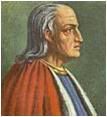 St. Anselm (Italian, 1033-1109)
St. Anselm (Italian, 1033-1109)
Benedictine monk, Archbishop of Canterbury
Doctor of the Church
OR for 4/20-4/21:
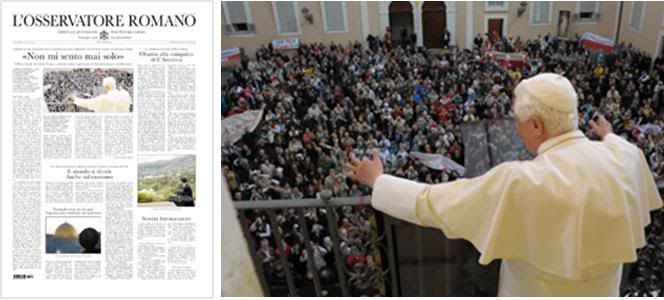
At the 'Regina caeli' prayers on the fourth anniversary of his Pontificate,
Benedict XVI offers Easter wishes to the Oriental churches
He also says, 'I never feel alone'
Other Page 1 stories: Obama sets out to 'conquer' the Ameericas, about the end of the pan-American summit in
Port of Spain; the world divided even on racism, as 9 nations boycott the UN conference [the walkout by European
nations during Ahmadinejad's speech while the Vatican delegation stayed on is not included in the story]; and
Israel's Prime Minister Netanyahu backtracks and now says he is ready to negotiate with Palestinians without
pre-conditions.
No events scheduled for the Holy Father today (Tuesday).
STATEMENT ON THE U.N. CONFERENCE
AGAINST RACISM AND DISCRIMINATION

The Press Office of the Holy See, through its Director, Father Federico Lombardi, SJ, anticipated yesterday evening some comments concerning the speech given yesterday by the Iranian President at the Review Conference of the Durban Declaration of 2001 against racism, racial discrimination, xenophobia and related intolerance.
Moreover, the Press Office wishes to recall the words of Pope Benedict XVI, who said last Sunday: "I express heartfelt prayers that the Delegates present at the Geneva Conference will work together, in a spirit of dialogue and mutual acceptance, so as to put an end to every form of racism, discrimination and intolerance, thereby marking a fundamental step towards the affirmation of the universal value of human dignity and human rights, within a framework of respect and justice for every person and every people."
In consequence, the Holy See deplores the use of this United Nations forum for the adoption of political positions, of an extremist and offensive nature, against any State. This does not contribute to dialogue and it provokes an unacceptable atmosphere of conflict.
What is needed, instead, is to make good use of this important opportunity to engage in dialogue together, according to the line of action that the Holy See has always adopted, with a view to effectively combating the racism and intolerance that still today affect children, women, those of African descent, migrants, indigenous peoples etc. in every part of the world.
The Holy See, in renewing the Pope’s appeal, reiterates that its own Delegation at the Conference is working in this spirit.
POPE'S TRIBUTE TO ST. ANSELM
ON HIS 900TH DEATH ANNIVERSARY
The Vatican also released the text of a letter from the Holy Father to the Primate Abbot of the Cofneerated benedicitine Monks, Fr. Notker Wolf, on the 900th anniversary of the death of St. Anselm. The letter is in Latin.
[Modificato da TERESA BENEDETTA 21/04/2009 17:41] |
 21/04/2009 14:44 21/04/2009 14:44 |
|
| | | OFFLINE | | Post: 17.185 | Registrato il: 28/08/2005
| Utente Gold | |
|
 Here's a belated post that would be outrageous, except it comes from one of the most extremist Islamist groups and is therefore not surprising. But should we be worried - more than usual, that is - for the Pope's security?
Jordan Islamists call for Pope Benedict
Here's a belated post that would be outrageous, except it comes from one of the most extremist Islamist groups and is therefore not surprising. But should we be worried - more than usual, that is - for the Pope's security?
Jordan Islamists call for Pope Benedict
to postpone Mideast trip, and demand
an apology for statements on Islam!

AMMAN, April 19 (dpa) - Jordan's influential Muslim Brotherhood movement on Sunday urged Pope Benedict XVI to postpone his planned Middle East visit next month and to apologize for statements that the group considers "injurious" to Islam.
"We hope that the Vatican will take a decision to postpone the visit until certain issues are cleared," Muslim Brotherhood official spokesman Jamil Abu Bakr said in a statement. [He actually held a news conference for this purpose, and the news agencies have released photos.]
"The Pope's visit to the region should reflect collaboration of Muslims and Christians throughout history, but sticking to provocative attitudes will not serve this message."
The head of the Roman Catholic Church is due to arrive May 8 in Jordan for a four-day visit to be followed by stops in Israel and the Palestinian territories.
Abu Bakr urged the Pontiff to "apologize to Muslims for his remarks against Islam and the Prophet Muhammad."
"Ignoring Muslims' sentiments by Pope Benedict XVI will only block the healing of wounds his statements caused," he said without specifying the statements made previously by the Pope against Muslims.
During a 2006 lecture at the University of Regensburg in Germany, where he once taught theology, Benedict quoted a 14th-century Byzantine emperor, one of the last Christian rulers before the fall of Constantinople to the Muslim Ottoman Empire: "Show me just what Muhammad brought that was new, and there you will find things only evil and inhuman, such as his command to spread by the sword the faith he preached."
The quote sparked an uproar in the Muslim world, and Benedict later apologized for giving any offense in a historical lecture that he said was meant to encourage mutually respectful dialogue with Muslims. He emphasized that the offensive words were not his own.
Abu Bakr expressed Islamists' objection to the pope's scheduled visit to the Holocaust memorial in Israel, saying the visit "will take place only a short time after the Zionist entity killed hundreds of Palestinian children, women and old men in the Gaza Strip. We ask if the Pope of the Vatican will visit Gaza to explore how humanity is being violated, or this does not deserve his visit?"
An estimated 1,300 Palestinians died during a 22-day conflict in December and January between Israel and the Palestinian militant movement Hamas, which rule Gaza.
During his trip to Jordan, Benedict is scheduled to visit a mosque in Amman and meet with a number of prominent Muslim scholars.
[Modificato da TERESA BENEDETTA 22/04/2009 02:06] |
 21/04/2009 23:21 21/04/2009 23:21 |
|
| | | OFFLINE | | Post: 17.187 | Registrato il: 28/08/2005
| Utente Gold | |
|
 Can the media provide the Israelis
Can the media provide the Israelis
with a crash course on Catholicism
in time for the Pope's visit?
Translated from
the Italian service of

In Israel, "there is, in general, a widespread ignorance about Catholicism and the revolutionary changes in the attitude of the Catholic Church towards Judaism, and the Jewish people, in particular", according to Prof. Daniel Rossing, director of the Center for Jewish-Christian Relations in Jerusalem.
"The problem,:" he said, "is that Christianity is not taught in Jewish schools.' [Neither are the basics about Judaism or Islam taught to Catholic children.]Anything that is taught has to do with Crusades and the Inquisition. There is nothing like a comparative study of religions." [But such an undertaking would normally be a college-level elective course, not part of general education.]
A similar view was offered by Rabbi Ron Kronish, co-director of the Inter-Religious Coordinating Council of Israel, which is engaged in promoting reciprocal knowledge among believers of the three monotheistic faiths.
"The young people who graduate from secondary schools know absolutely nothing about Vatican-II. And I don't know anyone who has ever taken the initiative of educating Jews on post-Vatican II Christianity". [As Vatican II was a Catholic undertaking, doesn't Nostra Aetate represent the position of the Catholic Church alone? I must admit I have not checked out whether the other Christian confessions formally or informally 'adopted' Nostra Aetate.]
Professor Rossing says this ignorance about Christianity, even in the Arab-Muslim community, explains the hostility of the new generations towards the Christian religion.
A recent survey conducted by his center in cooperation with the Jerusalem Institute for Israel Studies shows that it is the younger Jews who are less tolerant of Christianity.
Rossing says it should not be surprising: "Persons aged 18-20 are the products of the current educational system. They have absolutely no contact with the Christian world, unlike older Jews."
He believes that the absence of any basic notions about Christianity and Christian culture prevents young Israelis from having a correct historical vision of the world. And that is why he thinks the function of the media will be crucial for the coming pilgrimage of Benedict XVI.
Precisely to prepare the media for the event, Rossing's Center in Jerusalem has organized a symposium a few days before the Pope's arrival.
 Given that not many Catholics really know anything about Judaism, it is not surprising that not many Jews know anything about Catholicism either - and on both sides, what little is 'known' about the other may consist of nothing more than stereotypes and prejudices formed over centuries amounting to reciprocal misrepresentation.
Given that not many Catholics really know anything about Judaism, it is not surprising that not many Jews know anything about Catholicism either - and on both sides, what little is 'known' about the other may consist of nothing more than stereotypes and prejudices formed over centuries amounting to reciprocal misrepresentation.
This item from Vatican Radio caught my eye, because my first question was - Were the Muslims and Jews of Jordan, Palestine, and Israel prepared by the media in any way about Catholicism before and during John Paul II's visit in 2000? Or was all the publicity limited to the figure of the Pope?
And did Catholic schools and parishes take any initiatives at all after Vatican-II to incorporate some basic teaching material about Judaism and Islam for Sunday school and/or religious instruction of children as well as adults?
|
 22/04/2009 00:04 22/04/2009 00:04 |
|
| | | OFFLINE | | Post: 17.188 | Registrato il: 28/08/2005
| Utente Gold | |
|
 This is the third article in the ilssusidiario.net 'mini=special' on Benedict XVI's fourth anniversary as Pope (See other two aricles in an earlier psot above]. For some reason, this is available in an English translation online - I didn't realize ilsussidiario had an English outlet for certain pieces. This is one of them.
This is the third article in the ilssusidiario.net 'mini=special' on Benedict XVI's fourth anniversary as Pope (See other two aricles in an earlier psot above]. For some reason, this is available in an English translation online - I didn't realize ilsussidiario had an English outlet for certain pieces. This is one of them.
I prefer the title used in the Italian version: "Benedict XVI: An inconvenient man who can use his enemies' megaphone to make himself heard".
John Waters is a journalist who writes for the Irish Times {I posted a recent piece of his about the condoms-and-AIDS controversy), who recently published a book called LAPSED ATHEIST, described as "the story of one man's journey from belief to un-belief and back again. The author explores his own spiritual and religious adventure and observes how this has been echoed in contemporary society".
BENEDICT XVI:
A modern and radical Pope
for an age in identity crisis
by John Waters

April 20, 2009
Benedict XVI, after four years as Pope, continues to confound his enemies and to enchant his admirers with a Pontificate that appears brilliant from any aspect.
How recent seem those momentous spring days of 2005 when his predecessor both saddened us by his going and uplifted us with the dignity of his dying, reminding us that only in faith can humanity see past the ineluctable frontier.
And then the moment of succession, the emergence of the resolute figure of Joseph Cardinal Ratzinger to take the staff of St Peter in a time of unprecedented doubting and growing terror.
Benedict was, by the secular media analysis, a stop-gap and a throwback, a "reactionary", a "right-winger", an obscurantist. But what has emerged is what was implicit in his majesterial writings over several decades: a supreme intellect within a lively personality, a man who in his lifetime has watched mankind lurch between great good and the great evils, and seeks to reconcile these observations with the truths he has inherited.
One of the many paradoxes of being Pope in the modern world is that you must speak through a megaphone controlled by your enemies.
If John Paul II was an actor who communicated by disarming the megaphone-holders with his charisma and charm, Benedict’s strategy is determined subversion of the cultural codes controlled by those who oppose virtually everything the Catholic Church and its leader now stand for.
From the outset Pope Benedict has confronted the culture of the age head on: his first two encyclicals confronted the two most pressing issues of our time - love and hope, two concepts that have been bled out of the public discourse.
"In a world where the name of God is sometimes associated with vengeance or even a duty of hatred and violence ... I wish in my first Encyclical to speak of the love which God lavishes upon us and which we in turn must share with others", he wrote in Deus Caritas Est. God is love, not hate.
This subtle and brilliant Pope has struggled to be heard in a media climate characterised by sabotage and diversion. Repeatedly the media has sought to distort or reduce his statements, to make them fit with their prejudices such as they unfurled themon his election.
But Benedict has emerged from the episodes of Regensburg and La Sapienza, and more recently, from attempted misrepresentations of his statements about human sexuality and condoms as a means of combating Aids, as a man of courage and grace, his message undiluted, his status enhanced in the human spaces beyond the news desks and broadcast studios of the international media.
The importance of Benedict is that he brings an intellectual rigour to the core of Christianity in the public square, expounding and illuminating the core connections, and disconnections, between Christianity and modern culture.
John Paul II was a charismatic figure and a brilliant philosopher but in his public persona tended to emit a dualistic message: soft and lovable on the one hand, but rigidly and even simplistically traditionalist on the other.
Of course, this had a lot to do with media treatment of his message and personality, largely overlooking his vast canon of philosophical writings.
Benedict is adept at bringing Catholic canons back to their core significance, at reaching out, in spite of the background noise created around him by the media, to the educated generations of young people who now, as he correctly identified, hunger for something to transform the lassitude invoked in them by a culture selling sensation and freedom but nothing approaching the kind of satisfaction they crave.
Pope Benedict is a man who cannot be put in any box. He has a reputation as a theological traditionalist, but culturally he appears a modernist [Not a 'modernist' as much as someone who is so thoroughly acquainted with the culture of modernity that he can comfortably debate it with real modernists!], even at times as someone who comprehends the post-modernist impulse even better than many of its adherents.
Occasionally he strikes a wrong note, such as his criticism of the Harry Potter phenomenon, apparently at the prompting of a sole individual with an obsession in this connections, and which seemed to have been delivered without a thorough perusal of the books.
Such interventions occasionally serve to bolster the media caricature of a pope out of touch with modern society, when in truth they are simply the inevitable blind spots of a man in his ninth decade.* [Excuse me! See comment below!]
In truth he is the most modern and radical of popes. When he speaks, he does so as the head of the Roman Catholic Church, but his concern seems to be for the soul of society.
He faces an age in the throes of an identity crisis and seeks to show it the way out. His project is the restoration to Western culture of an integrated concept of reason, the re-separation of the metaphysical from the physical.
The unarmed coup of the 1960s, which sought to install scientific-rationalism as the guiding cultural light of the age, has failed to convince even its own adherents, who, alarmed by the listlessness of their children and the imminence of the darkness they have themselves summoned, now cry out for reassurance to neo-atheists like Richard Dawkins and Christopher Hitchens.
But already, the idea that “God is dead” has become yesterday’s news, as modern societies seek to move beyond reductionist forms of reason to something that incorporates more of the human experience than merely the head.
As the ideologies of the Sixties' "freedom" project shatter on the rocks of reality; as the proponents of these ideologies begin to perceive that they do not, after all, have answers to the most fundamental dilemmas of humanity; as we slouch towards what my esteemed colleague Magdi Allam has called "the suicide of our civilization"; we may hope and pray that Benedict remains with us through the next crucial decade, whisperingly conveying his ancient truths through the megaphone of his enemies.
[I must interpolate here a prompt rejoinder by a reader to the Harry Potter reference in this article in which he writes:
The accusation that the comments of Joseph Cardinal Ratzinger regarding Harry Potter reveal his "blind spots" may be a case of John Waters protecting his own "blind spots" onto the Pope. What the then Cardinal wrote [about Harry Potter] was:
My dear Ms. Kuby!... It is good, that you enlighten people about Harry Potter, because there are subtle seductions, which act unnoticed and by this deeply distort Christianity in the soul, before it can grow properly.”
So the issue was "subtle seductions" that can deceive children.
If the Pope is out of step on this fact then so too are several young Catholic priests who are exorcists. Because of their personal experiences with the Evil One and because during exorcisms they learn from the devil himself how he gained access to a soul, many of these priests likewise oppose Harry Potter.
Perhaps it is John Waters who suffers from "blind spots" about the tactics of the devil and about the influence that the cult of magic can have on a vulnerable soul "before it can grow properly."
 |
|
|
|
|